Medical research suffers from sex and gender bias. New standards hope to change that
ABC Health & Wellbeing
Topic: Women's Health
Considering sex and gender in health and medical research can improve health outcomes and reduce inequities. ( Getty Images: Tetra Images )
Evidence suggests there are clinically significant sex and gender differences across a broad range of diseases but these often aren't factored into research and treatment.
Australia's largest health and medical research funding body has recommended sex, gender, variations of sex characteristics and sexual orientation be routinely considered in health and medical research.

What's next?
Experts say the new recommendations need to be incorporated into research funding applications to ensure research is more inclusive and equitable.
When Cheryl Carcel was in medical school, little attention was paid to the role that sex and gender can play in the detection and treatment of many major diseases.
"We weren't taught that men and women might present differently or have different outcomes."
Associate Professor Cheryl Carcel is a neurologist and head of the Brain Health Program at The George Institute for Global Health. ( Supplied: The George Institute of Global Health )
But Dr Carcel, a neurologist and head of the Brain Health Program at The George Institute for Global Health, said in her own field — and many other areas of medicine — such differences were stark.
Last year, she co-authored a study investigating the medical care that people with stroke receive before arriving at hospital in NSW , and found women were less likely to have their stroke recognised compared to men.
"[Women] were thought to be having a migraine, high blood pressure, or some type of headache or nausea," she said.
"And we think one of the reasons is because some of the symptoms of women are not recognised as being stroke."
Stroke isn't unique in this regard: women are less likely to be diagnosed and appropriately treated if they suffer a serious heart attack , less likely to have chronic pain acknowledged and treated , and more likely to be misdiagnosed or discharged during a serious medical event .
Bronwyn Graham, director of the Centre for Sex and Gender Equity in Health and Medicine, said part of the reason was because women had been under-represented in medical research for decades.
"Our models of how diseases emerge in humans, the ways they look and the ways they can be treated, are based on the male body, and those findings don't always translate," said Professor Graham.
"The consequence is that we see poorer health outcomes and treatments that are not evidence-based for certain sex and gender groups."
Major funding body calls for attention on sex and gender
In early August, the National Health and Medical Research Council (NHMRC) released a statement encouraging sex, gender, variations of sex characteristics and sexual orientation to be routinely considered in health and medical research.
The NHMRC is the largest public funder of health and medical research in Australia and distributes hundreds of millions of dollars in research grants every year, including through the Medical Research Future Fund (MRFF).
"What it means in practice is that researchers should consider these variables at all stages of the research process," said Professor Graham, who is also a professor of psychology at the University of New South Wales.
"So that's from the very start (what questions should we be asking?) through to the conduct of the study (do we have equal representation of sexes and genders?) to how data are analysed and reported … and then how things get translated into healthcare practices."
Gender bias in medicine means conditions that primarily affect women and other under-represented groups have been understudied and are therefore less understood. ( Getty Images: dragana991 )
A growing body of evidence suggests there are clinically significant sex and gender differences across a broad range of diseases , from susceptibility and screening to risk factors, treatment and prognosis.
The aim of the statement, according to the NHMRC, is to improve health outcomes and ensure medical research produces evidence that is relevant to all people.
It encourages researchers to increase the representation and involvement of historically under-represented groups, including women, trans and non-binary people, people with variations of sex characteristics (intersex) and diverse sexual orientations.
A recent study showed while women were over-represented in research perceived to 'female-patient' dominated, they were they were significantly under-represented in other areas, such as cardiology.
Meanwhile, intersex and non-binary people were found to be severely under-represented across all areas of medical research.
"Women are often the people who are missing out here — women, intersex, trans and non-binary folk," Professor Graham said.
"We see in practice, for example, that women are 50 per cent more likely to have adverse reactions to drugs and vaccines than men; that pain medications don't work as effectively in women as they do in men; and that women are more likely to develop chronic pain conditions and addictions to pain medication."
Professor Bronwyn Graham is director of the Centre for Sex and Gender Equity in Health and Medicine, a collaboration of The George Institute, Deakin University and the Australian Human Rights Institute at UNSW. ( Supplied: The George Institute of Global Health )
In Australia, research shows women disproportionately experience delayed diagnosis, overprescribing, and a failure to have their symptoms properly investigated .
Professor Graham said that failing to consider biological and physical characteristics in research, as well as gender roles and behaviours, also meant that men miss out.
"If we're looking at things in a sex- and gender-blind fashion, we're also not thinking about what are the unique things about men that we need to pay attention to that might actually impact the prognosis of an illness … and also response to treatment."
Australia lags behind on sex and gender equity
Last year, a study co-authored by Dr Carcel found just 30 per cent of health and medical research publications in Australia analysed their findings by sex and/or gender.
"The NHMRC statement is groundbreaking for Australia," she said.
"It's not meant to increase the pool of researchers who focus on these variables, but is for all researchers applying for NHMRC and MRFF grants."
Historically, the tendency to conduct scientific research on men and generalise the findings, including to women, has been driven largely by concerns over potential harm to the female reproductive system.
Martha Hickey, a professor of obstetrics and gynaecology at the University of Melbourne, said the exclusion of women was also a product of the misguided belief that female hormonal fluctuations may affect the reliability of study results.
"There were a number of false assumptions made at different levels," said Professor Hickey, an NHMRC Leadership Fellow.
"I think all of us have been surprised by how far down this goes. It wasn't just about [research on] people, it was also animals, and even cell-based research."
Professor Hickey, who contributed to the development of the new NHMRC statement, said when it came to recognising sex and gender differences, Australia lagged behind Europe and North America.
"The Americans have been doing this for more than 20 years, by which I mean stating that there needs to be equal numbers of males and females and other important variable groups taken into consideration," she said.
"I think we've all learnt that research is better if it's inclusive, and it's more likely to be taken up."
Research grants should reflect new recommendations, experts say
While Professor Graham described the statement as "an incredibly positive step", she expressed concern that the new recommendations were not yet "written into policy".
"There is nowhere in the grant application process where researchers are required to indicate how they have taken sex, gender, variations of sex characteristics and sexual orientation into account."
Traditionally, researchers have worked with male lab animals and primarily used men in clinical trials. ( Getty Images: SolStock )
In some circumstances, having equal gender representation or analysing data by sex may not be necessary, but she said researchers should still have clear reasoning as to why.
"They should still need to justify the sample: how is it actually representative? Is the research being conducted in the population that stands to benefit from this research?"
Dr Carcel agreed, and said the statement should be followed up with an implementation and evaluation plan requiring sex and gender to be addressed in grant applications where appropriate.
A spokesperson for the NHMRC said researchers and their institutions were being "encouraged to reflect on the statement and start doing what they can now", but no formal requirement was in place.
"The next phase of work will include consideration of how to incorporate the statement in granting processes," the spokesperson said.
Improving knowledge and healthcare requires sector-wide change
In addition to funding bodies, Dr Carcel stressed that universities, medical research institutes, and health and medical journals had a significant role to play in improving sex and gender equity.
"[Journal editors] act as gatekeepers of bad science, and bad science is what we get if we don't include sex and gender into our research."
Professor Graham agreed: "The places in which we practise research have a huge amount of control over our code of conduct. If [universities and medical research institutes] implement their own policies, that is a further support to ensure things like the NHMRC statement can gain momentum."
In 2023, the NHMRC introduced measures to ensure an equal number of men and women were awarded senior investigator grants , which Professor Hickey said would also help to "change the nature of research".
She added that there had been a major "feminisation" of the medical workforce and that awareness of sex and gender differences was "much more apparent" than in the past, but that improvements in knowledge wouldn't solve the problem alone.
"The bias isn't only around clinicians not understanding how women may present, it also appears to be how doctors and other health personnel respond to them," she said.
In a recent survey of almost 3,000 Australian women, two in three reported health care-related bias and discrimination , with many women feeling dismissed and disbelieved.
"We've got a lot to learn," Professor Hickey said.
Health in your inbox
- Partner with us
- Apply Online

Pirogov Medical University
The university.
- Recognitions
- Eligibility
- Fees Structure
Founded in 1906 in the city of Moscow, Pirogov Medical University—officially known as Russian National Research Medical University named after N. I. Pirogov— is one of the oldest medical universities in Russia. The first lecture took place on September 26, 1906, with 206 students, and the first graduation ceremony was celebrated in 1912. The University claims to be the first university in Russia that started offering medical education to women in the Russian Federation.It independently carries out various research projects in medicine and has received the status of National Research University in 2010.The Library of Pirogov Medical University has a collection of more than 7,50,000 books. For world-class clinical training and diverse practical exposure, the University collaborates with more 120 hospitals across the city of Moscow. Pirogov Medical University started accepting international students in 1959. Presently, more than 8,000 students are studying medicine at the University, out of which about 700 are international students. The University has a strong team of about 2,000 faculty members. Pirogov Medical University is approved by the Medical Council of India (MCI) and offers a 6-Year Program for MBBS in Russia. Students in India, who have qualified NEET, can apply for direct admission to the MBBS Program of Pirogov Medical University.
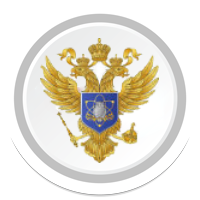
Ministry of Science and Higher Education, Russia
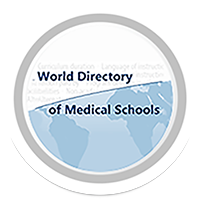
World Directory of Medical Schools (WDOMS)
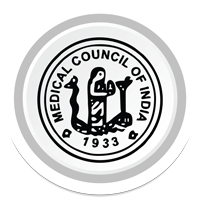
Medical Council of India (MCI)

Foundation for Advancement of International Medical Education and Research (FAIMER)
To get admission to the MBBS Program of Pirogov Medical University, the student must qualify NEET-UG (National Eligibility cum Entrance Test-Undergraduate).
Besides NEET-UG, there is no requirement to go through any additional entrance examination.
|
|
|
|
|
|
|
| Fees for Tuition, Hostel, and Medical Insurance | Yearly Payments | Fees for Year I | US$ 8,850 |
| Fees for Year II | US$ 8,150 | |||
| Fees for Year III | US$ 8,150 | |||
| Fees for Year IV | US$ 8,150 | |||
| Fees for Year V | US$ 8,150 | |||
| Fees for Year VI | US$ 8,150 | |||
|
| Mess Charges | Yearly Payments | Mess charges | US$ 1200 per year |
RUS EDUCATION SUPPORT

INDIAN FOOD
MODERN CLASSROOMS
Medical Laboratories
Clinical Training
Recreational Facilities
Ensured Safety
FMGE (Foreign Medical Graduates Examination) Preparation
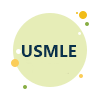
USMLE (United States Medical Licensing Examination) Preparation

- Pirogov Medical University was founded in 1906 in the Moscow city of Russia.
- In 1930, Pirogov Medical University organized the World’s first pediatric faculty.
- In 1963, Pirogov Medical University organized the World’s first biomedical faculty.
- In 2010, Pirogov Medical University received the status of National Research University.
- Presently, more than 8,000 students are studying at Pirogov Medical University, out of which about 700 are international students.
University Address
Mbbs program, admission & support, medical licensing examination support, student life.
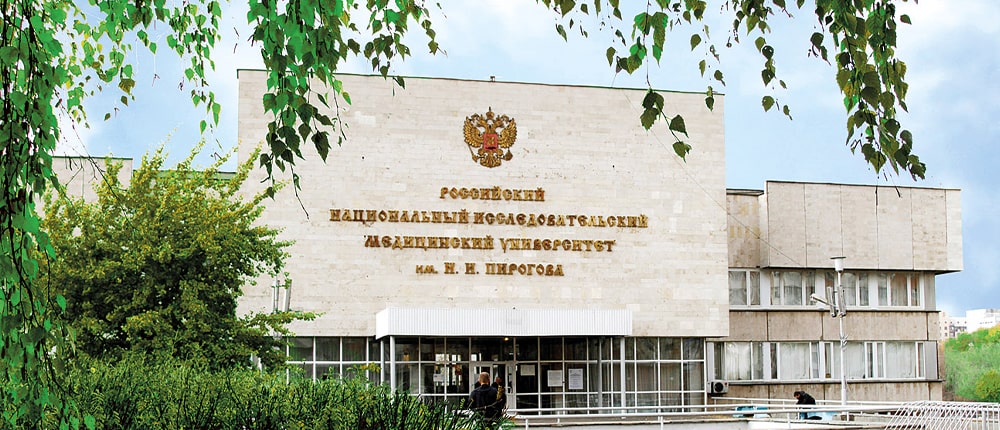
Founded in 1906 in the city of Moscow, Pirogov Medical University—officially known as Russian National Research Medical University named after N. I. Pirogov— is one of the oldest medical universities in Russia. The first lecture took place on September 26, 1906, with 206 students, and the first graduation ceremony was celebrated in 1912.
Focused on constantly improving the quality of education, the University entered the list of Times Higher Education World University Rankings and QS World University Rankings in 2019.
The University claims to be the first university in Russia that started offering medical education to women in the Russian Federation. Among all milestones achieved by the University, two most celebrated achievements are that Pirogov Medical University created the world’s first pediatric faculty in 1930 and the world’s first biomedical faculty in 1963.
To provide students and visitors a glimpse into the decades of the glorious history of the University, Museum of the History of Pirogov Medical University was established in 1981, which continues to capture astonishing achievements of the University, its students, and members.
The University maintains a leading position in Russia by actively participating in activities of medical research and healthcare and delivering excellence in medical education and care.
The University independently carries out various research projects in medicine and has received the status of National Research University in 2010. Conducting pre-clinical as well as clinical studies for a better understanding of human diseases, new medicines, and medical devices have been the center of research at Pirogov Medical University.
To keep the students and healthcare professionals updated on the latest research and innovations in medicine, the University publishes its own scientific journal with articles on biomedical sciences and clinical medicine.
The Library of Pirogov Medical University has a collection of more than 7,50,000 books. Students can also access scientific journals and eBooks through the electronic library system. In collaboration with other universities, academic mobility and exchange programs are also arranged for students to help them get experience in other institutions and build new connections.
For the healthcare of locals, the University operates clinical centers in Moscow. Students are provided hands-on clinical training in these University-operated clinics and also involved in various clinical studies. For world-class training and diverse practical exposure, the University collaborates with more 120 hospitals across the city of Moscow.
Pirogov Medical University started accepting international students in 1959. Until now, the University has trained more than 80,000 doctors. Presently, more than 8,000 students are studying medicine at the University, out of which about 700 are international students. The University has a strong team of about 2,000 faculty members.
Pirogov Medical University is listed in the World Directory of Medical Schools (WDOMS) and certified by the Educational Commission for Foreign Medical Graduates (ECFMG), United States of America. Pirogov Medical University is also approved by the Medical Council of Canada (MCC) and the Medical Council of India (MCI). The University offers a 6-Year Program for MBBS in Russia for local as well as international medical aspirants. Students in India, who have qualified NEET, can apply for direct admission to the MBBS Program of Pirogov Medical University.

Pirogov Medical University Faculty of Medicine 1 Ostrovityanov Str Moscow, 117997 Russian Federation
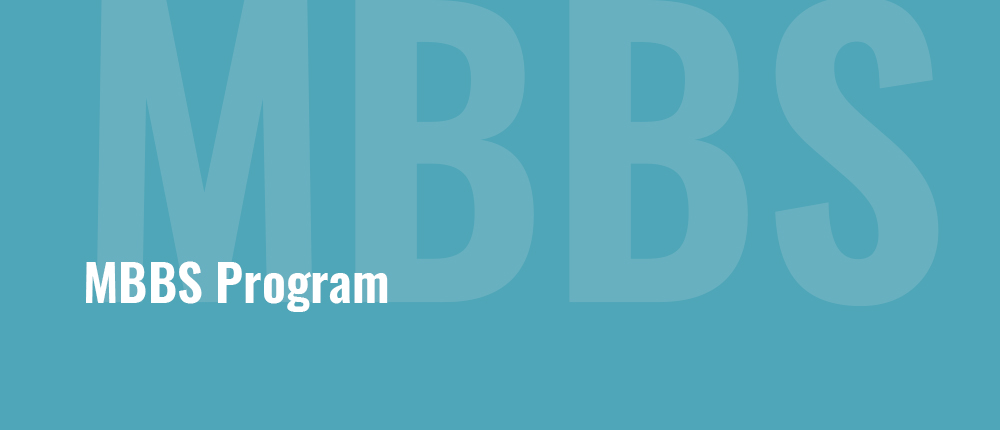
Pirogov Medical University offers a 6-Year MBBS Program in the Russian language. For international students, classes for initial years may be organized in English medium.
The Program for MBBS in Russia is focused on building a strong academic base with a pragmatic approach to education and medical research. To provide hands-on clinical experience, the students studying MBBS in Russia are involved in clinical training from the second year of MBBS. While education in classrooms and laboratories helps the students develop academic skills and sound theoretical understanding, clinical training in University-affiliated hospitals help them apply their knowledge into practice.

To get admission to the MBBS Program of Pirogov Medical University, you can apply online at Rus Education website.
Rus Education is duly authorized by the Russian Centre for Science and Culture (Cultural Department of The Embassy of the Russian Federation in India) to promote Russian Education among Indian Citizens. Rus Education is also an authorized associate of Pirogov Medical University. We facilitate one-window admission to the MBBS Program of Pirogov Medical University with no requirement of any donation or capitation and without any entrance examination.

| FMGE (Foreign Medical Graduates Examination) Preparation |
|
| USMLE (United States Medical Licensing Examination) Preparation |
|

Pirogov Medical University offers a healthy student life and an opportunity to experience life in Moscow, the capital city of Russia, and also the most vibrant and exciting location in the largest country in the world!
For affordable accommodation of students and make their living experience safe and better, the University maintains a comfortable dormitory. Every room is shared by two or three students, and each floor has a shared kitchen where students can cook their food. Members of the dormitory help the newcomers to settle in their new homes. For the safety of the students, the University’s security team maintains 24-hour surveillance and is capable of providing emergency response, if required.
To help students adjust to life at university, it has a dedicated Student Support System in place. Every group of new students is assigned to two professors who guide the students not only about studying but about living as well, helping students adjust to the new environment and feel comfortable.
To keep students fit and active, Sports Center on the campus is equipped with facilities to play various sports, including badminton, basketball, volleyball, table tennis, swimming, football, hockey, chess, etc. Student can unleash their creativity by indulging in extracurricular adventures offered by Student Organizations and Societies. On the campus, there are ample opportunities for self-improvement and taking part in music, dance, sports competitions, and theater.
For peer support, the University has a Student Council in place which offers support in academic as well as non-academic matters making student life stress free.
For the social upliftment and help students connect with the society and local people, they are involved in community and welfare organized by the University, including medical outreach, health awareness programs, and blood donation camps. The University Volunteer Center organizes a number of volunteer activities to help students contribute to social causes.
Living in Moscow, students can explore its cultural heritage, museums, historic buildings, the world-famous Alexander Garden, and much more. For traveling in Moscow, students don’t face any problems, thanks to its convenient and cheap transportation system, especially the Moscow Metro.
With the charm of Moscow and all the student facilities and support services offered by the University, student life at Pirogov Medical University is a delight.
TOP MEDICAL UNIVERSITIES IN RUSSIA
.jpg)
Perm State Medical University
.jpg)
Tver State Medical University
.jpg)
Orenburg State Medical University
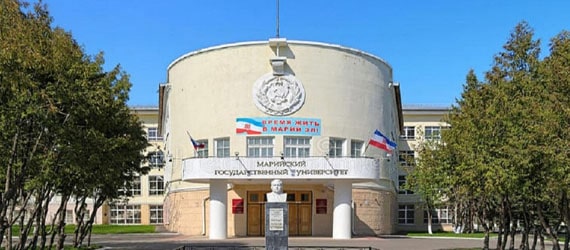
Mari State University
.jpg)
Siberian State Medical University
A php error was encountered.
Severity: Notice
Message: Undefined variable: countries
Filename: includes/footer.php
Line Number: 26
File: /home/mbbsinrussia/public_html/application/views/includes/footer.php Line: 26 Function: _error_handler
File: /home/mbbsinrussia/public_html/application/controllers/University.php Line: 46 Function: view
File: /home/mbbsinrussia/public_html/index.php Line: 315 Function: require_once
Severity: Warning
Message: Invalid argument supplied for foreach()
Message: Undefined variable: state
Line Number: 44
File: /home/mbbsinrussia/public_html/application/views/includes/footer.php Line: 44 Function: _error_handler
©2024-25 Rus Education.
Here’s how you know
- U.S. Department of Health and Human Services
- National Institutes of Health
NCCIH Research Blog
September 13 council meeting to spotlight care for health network and nih nutrition initiatives.
August 19, 2024
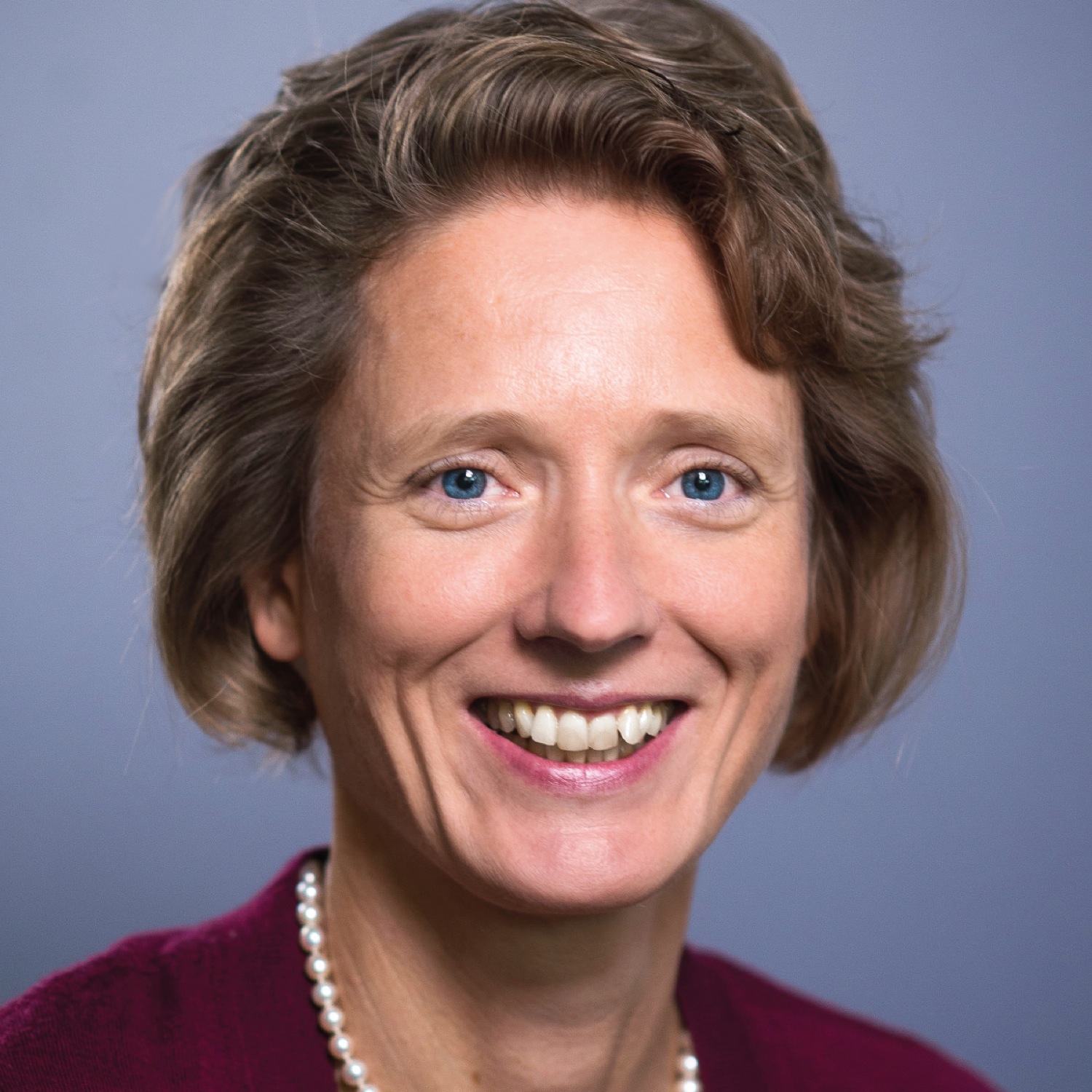
Martina Schmidt , Ph.D.
Division of Extramural Activities
National Center for Complementary and Integrative Health
View biographical sketch
We welcome you to join us for the upcoming open session of the National Advisory Council for Complementary and Integrative Health (NACCIH) meeting on Friday, September 13, 2024 .
The open session will be livestreamed on NIH VideoCast from 10:40 a.m. to 4 p.m. ET, and the recorded video will be posted several days later. Registration to watch the livestream is not necessary, and all are invited to attend online. There is also limited space available to attend the meeting in person on the National Institutes of Health (NIH) campus in Bethesda, Maryland.
The NACCIH is charged with advising, consulting with, and making recommendations to the director of the National Center for Complementary and Integrative Health (NCCIH) on matters relating to the Center’s research activities and functions. In the open session of the meeting, NCCIH staff provide updates on the Center’s activities, policies, and funding priorities, and one or more speakers from outside NCCIH may be invited to present on topics relevant to the Center.
On September 13, the open session will offer the following presentations, which will then be discussed by Council members:
- Dr. Helene M. Langevin , the NCCIH director, will present an update on news about NCCIH and NIH in general, as well as on past and upcoming events and activities NCCIH has been and will be involved with since the last Council meeting in May 2024.
- Dr. David Shurtleff , the NCCIH deputy director and the acting scientific director of our Division of Intramural Research , will present the annual report focusing on recent developments and accomplishments by NCCIH’s intramural research program.
- Dr. Langevin; Dr. Stefan M. Pasiakos , director of the NIH Office of Dietary Supplements; and Dr. Andrew A. Bremer , director of the NIH Office of Nutrition Research, will be the speakers for our session entitled “Nutrition Continuum Symposium.” Dr. Langevin will present an overview and Drs. Bremer and Pasiakos will be focusing on this topic in the context of the research priorities of their respective offices.
- Dr. Amy P. Patterson, director of scientific research, program policy, and strategic initiatives at the National Heart, Lung, and Blood Institute, will discuss a project funded by the NIH Common Fund, Communities Advancing Research Equity for Health™ (CARE for Health™) . This is a newly formed national network for conducting research in primary care settings to address barriers to access to research participation in communities that are traditionally underrepresented in clinical research.
- Program staff from the NCCIH Division of Extramural Research will present concepts for the Council’s review, comment, and voting. A concept is an early planning stage in the development of a new research initiative. More details about the topics will be available closer to the meeting date.
Current Procedure for Public Comment
As always, public comment is welcome. All comments must be provided in written form (up to 750 words) and emailed to me by Friday, August 30, in time to be shared with Council members in advance of the meeting. My email address is [email protected] .
We hope that you can join us for all or part of the open session!
For More Information
- View the agenda for the September 13, 2024, Council meeting.
Tags: NCCIH Advisory Council
Post Comments
We welcome your comments and expect that they will be respectful. This is a moderated blog, and your comments will be reviewed before they are posted. Read our comment policy
Subscribe to the Blog
Get New Blog Posts by Email
Search the Blog
September 13 Council Meeting To Spotlight CARE for Health Network and NIH Nutrition Initiatives Martina Schmidt, Ph.D. August 19, 2024
Check Out Our New Video Library for Researchers Wendy J. Weber, N.D., Ph.D., M.P.H. August 16, 2024
New Data Management and Sharing Reporting Requirement Starts October 1, 2024 Debbie Chen July 29, 2024
Grant and Research Policies (37)
Grant Application Review (20)
Grant Writing (34)
Intramural Research Program (1)
Lectures (21)
Meetings (70)
Military and Veterans (5)
Mind and Body Practices (16)
Natural Products (28)
NCCIH Advisory Council (22)
NCCIH Research (72)
NCCIH Staff News (13)
NIH News (12)
Notice of Funding Opportunity (NOFO) (70)
Research Priorities (47)
Research Results (5)
Research Training (28)
Strategic Plans (13)
Video Blog Posts (3)
NIH Director's Blog
NIGMS Feedback Loop Blog
Inside NIA: A Blog for Researchers
NIMH Director’s Blog
NIDA Directors’ Blog
I Am Intramural
Frequently Asked Questions (FAQs)
Comment Policy
Privacy Policy
Russia Among Global Top Ten Improvers for Progress Made in Health and Education, says World Bank Report
MOSCOW, September, 16, 2020 – Russia is among the top ten countries globally for improvements to human capital development over the last decade, according to the latest update of the World Bank’s Human Capital Index (HCI).
The 2020 Human Capital Index includes health and education data for 174 countries covering 98 percent of the world’s population up to March 2020.
Russia's improvements were largely in health, reflected in better child and adult survival rates and reduced stunting. Across the Europe and Central Asia region, Russia, along with Azerbaijan, Albania, Montenegro, and Poland, also made the largest gains in increasing expected years of schooling - mainly due to improvements in secondary school and pre-primary enrollments. The report also shows that over the last 10 years Russia has seen a reduction in adult mortality rates. However, absolute values of this indicator remain high in the country with this progress now at risk due to the global Covid-19 pandemic.
“ Human capital contributes greatly to improving of economic growth in every country. Investments in knowledge and health that people accumulate during their lives are of paramount concern to governments around the world. Russia is among the top improvers globally in the Index. However, challenges persist and much needs to be done to improve the absolute values of Index indicators, ” said Renaud Seligmann, the World Bank Country Director in Russia.
The HCI, first launched in 2018, looks at a child’s trajectory, from birth to age 18, on such critical metrics as child survival (birth to age 5); expected years of primary and secondary education adjusted for quality; child stunting; and adult survival rates. HCI 2020, based on data up to March of this year, provides a crucial pre-pandemic baseline that can help inform health and education policies and investments for the post-pandemic recovery.
Of the 48 countries in Europe and Central Asia included in the 2020 Human Capital Index (HCI), 33 are among the upper-third in the world, and almost all are in the top half. However, there are significant variations within the region.
In Russia, a child born today can expect to achieve 68 percent of the productivity of a fully educated adult in optimal health. It is at the average level for Europe and Central Asia countries and the third result globally among the countries of the same income group. There is a stark contrast between education and health subscales in Russia. While the education outcomes of the country are high and outperform many high-income peers, its health outcomes are below the global average.
Washington DC
Pirogov Russian National Research Medical University 2024-25: Admission, Fees, Eligibility, Ranking etc.
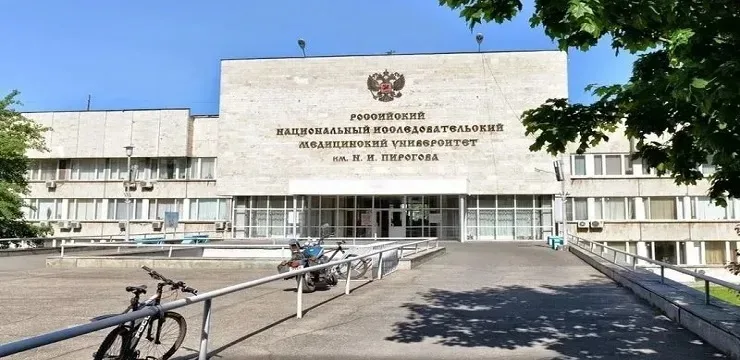
Pirogov Russian National Research Medical University, previously referred to as Pirogov Medical University, is a leading institution for MBBS education in Russia. Established in 1906 and situated in Moscow, the capital city, it stands as the oldest and most esteemed medical university in the country. Renowned for its rigorous academic standards and exceptional education quality, Pirogov Medical University offers an extensive array of undergraduate and postgraduate programs in medicine, dentistry, pharmacy, and various other health-related fields. With its reputation for selectivity, the university attracts talented students from around the globe, further solidifying its position as a premier destination for medical education.
| Abroad University MBBS Application Form 2024 | |
|---|---|
| Manipal Pokhara College of Medical Science, Pokhara, Nepal | |
| Kursk State Medical University, Russia | |
| Grigol Robakidze University, Georgia | |
Pirogov Russian National Research Medical University is approved by the National Medical Commission of India (NMC) and the World Health Organization (WHO). This article provides information about Pirogov Russian National Research Medical University for Indian Students, such as Courses Offered, Admission Process, Eligibility Criteria, Fee Structure, Ranking etc.
[Page Index]
College summary.
Before we complete the college Summary, let us look at the essential details of the Pirogov Russian National Research Medical University.
Wants to Study MBBS Abroad from a top Country with low tution Fees? Subscribe Now!
| Russian National Medical University | |
| Moscow, Russia | |
| 1906 | |
| Public | |
| Sergey Lukyanov | |
| English & Russian | |
| Not Required | |
| , | |
| Ministry of Health of the Russian Federation | |
| MBBS | |
| USD: $7700/- (Per-Annual) INR-: Rs.6,40,000/- (Per-Annual) | |
| Country- 29 World- 2009 ( : Edurank ) | |
| September Intake | |
| Yes (Male & Female) | |
| Sheremetyevo International Airport | |
| https://rsmu.ru/ | |
Affiliation and Recognition
These are the renowned bodies who’ve given reputation the Pirogov Russian National Research Medical University.
- National Medical Commission of India (NMC).
- World Health Organization (WHO).
- Ministry of Science & Higher Education of the Russian Federation.
The faculties at Pirogov Russian National Research Medical University differ from one department to another, encompassing various disciplines and specialities.
| Faculty of General Medicine | Faculty of Pharmacy |
| Faculty of Dentistry | Faculty of Pediatrics |
| Faculty of Biomedicine | Faculty of Psychological-Social Faculty |
Courses Offered
Pirogov Russian National Research Medical University Courses offer quality medical programs under highly qualified faculty and state-of-the-art infrastructure. This College is famous for its undergraduate medical programs if you want more details about the MBBS course .
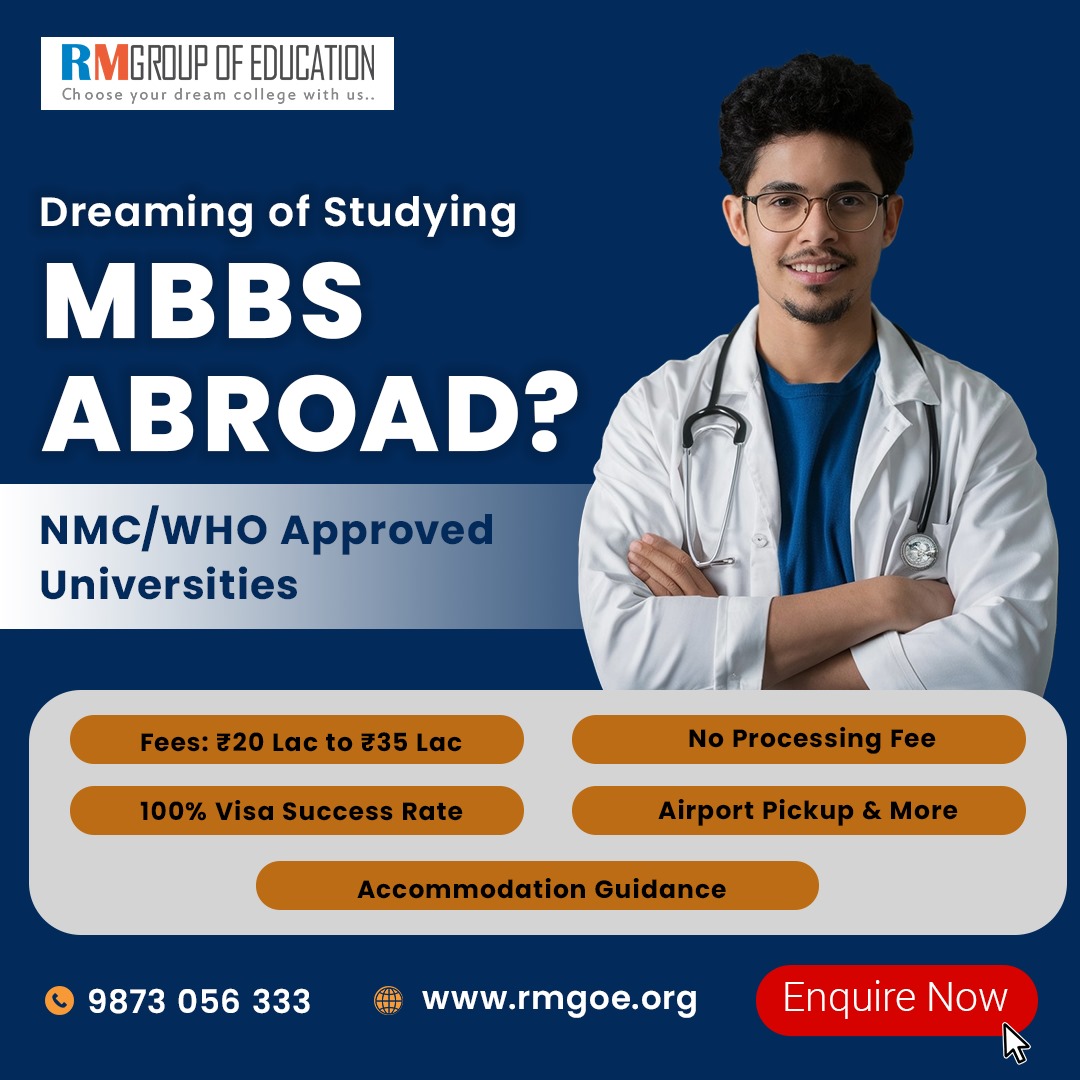
| MBBS | 6 Years (English Medium) 7 Years (Russian Medium) |
Why Study MBBS at Pirogov Russian National Research Medical University?
- Russian National Research Medical University is located in Russia’s liveliest and most spectacular cities.
- The staff consists of over 1900 professors who teach 100 subjects on the same university campus itself which ensures high-quality education.
- This is one of the top-rated medical universities in Russia.
- Most of the large government hospitals in Moscow are affiliated with this university.
- This university is accredited by the Medical Council of India and approved by the World Health Organization.
Admission Procedure
If you want to take admission in 2024, you must qualify for the National Eligibility Entrance Exam (NEET) for Indian students.
- Step 1: Complete the admission form and ensure all required documents are attached.
- Step 2: Submit the admission form along with the necessary documents.
- Step 3: Await the admission/acceptance letter from the university.
- Step 4: Apply for the student visa once you receive the acceptance letter.
- Step 5: Make preparations for travel to your university.
- Step 6: Upon arrival, complete the formalities required by the university for enrollment.
Eligibility Criteria
In this section, all the students check the eligibility criteria of the Pirogov Russian National Research Medical University.
| Your age should be at least 17 years old on or before 31st December of the admission year. *No Upper Age Limit. | |
| Class 12th in Science, with PCB and English subjects from a board recognized by the authorities in India. | |
| 50% in 10+2 (UR) 45% (SC/OBC/ST) | |
| (For Indian Students) |
Graphical Representation of Eligibility Criteria
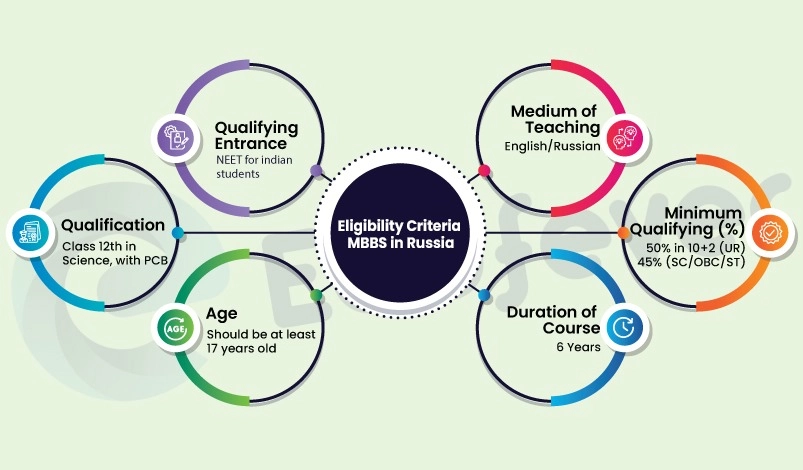
Documents Required
Before taking admission to Pirogov Russian National Research Medical University, please do not forget to carry all these related documents.
- Passport (Minimum 18 months validity).
- 10th Certificate & Mark sheet.
- 12th Certificate & Mark sheet.
- Birth Certificate.
- 10 passport-size Photographs
- Official Invitation letter from the Medical University of Russia.
- Authorization of all documents from the Ministry of External Affairs, New Delhi.
- Legalization of all documents from the Russian Embassy.
- Bank receipt of 1st Year of Russian National Research Medical University Tuition fees (required for some Universities).
- HIV test documents.
Fee Structure 2024-25
In this section, all the MBBS Students get information about the Pirogov Russian National Research Medical University Fees 2024. Check all the relevant queries regarding fees following this page: Low fees for MBBS Colleges in Russia .
| Particulars | Year 1 | Year 2 | Year 3 | Year 4 | Year 5 | Year 6 |
| Tuition Fee | $7700 | $7700 | $7700 | $7700 | $7700 | $7700 |
| Fees in Indian Rupees | Rs.6.16 Lakhs | Rs.6.16 Lakhs | Rs.6.16 Lakhs | Rs.6.16 Lakhs | Rs.6.16 Lakhs | Rs.6.16 Lakhs |
| Hostel Fees | $300 | $300 | $300 | $300 | $300 | $300 |
| Hostel Fee in Rupees | Rs.24,000 | Rs.24,000 | Rs.24,000 | Rs.24,000 | Rs.24,000 | Rs.24,000 |
| Total Fees in Indian Rupees | Rs.6.40 Lakhs | Rs.6.40 Lakhs | Rs.6.40 Lakhs | Rs.6.40 Lakhs | Rs.6.40 Lakhs | Rs.6.40 Lakhs |
Ranking 2024-25
According to EduRank, the Pirogov Russian National Research Medical University ranking in Russia and all over the world:
| Country Ranking | 29 |
| World Ranking | 2009 |
Advantages of MBBS in Russia
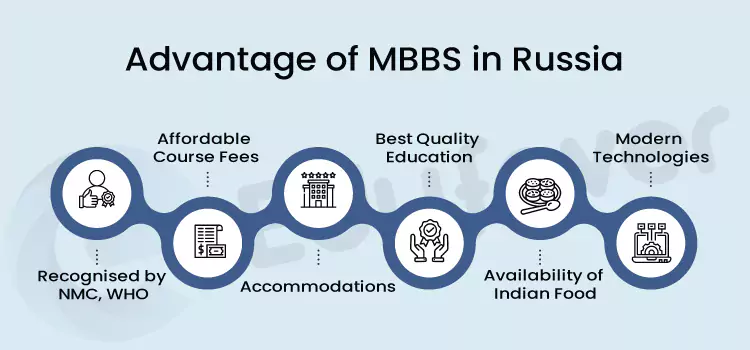
MBBS Syllabus
The following is the comprehensive syllabus for the MBBS program at Pirogov Russian National Research Medical University:
| Year | Semester | Subjects |
|---|---|---|
| 1 Year | 1 Semester | Anatomy |
| 2 Semester | Anatomy and Histology | |
| 2 Year | 3 Semester | Histology, Biochemistry, Anatomy, Physiology, cell biology, Microbiology, General pathology |
| 4 Semester | Biochemistry, Micro-Biology, Physiology | |
| 3 Year | 5 Semester | Pathology, Pharmacology, Micro-Biology, Path Physiology |
| 6 Semester | Pathology, Path Physiology and Pharmacology, Genetics | |
| 4 -6 Year | 7 -12 Semester | General Surgery, Neurology, Primary Care Medicine, Obstetrics and Gynecology, Oncology, Internal Medicine, Pediatrics, Internal medicine, Neurology and Psychiatry, Psychology, ENT, Emergency Medicine, and Cardiology |
About Moscow City, Russia
- Moscow is the capital and largest city of Russia.
- It is a major political, economic, cultural, and scientific center in Russia and in Eastern Europe.
- Moscow City is located on the Moskva River in Central Russia.
- Moscow City is a global city and one of the leading center for business, finance, culture, and education in the world.
- Moscow City is also a popular tourist destination, with attractions such as the Kremlin, Red Square, and St. Basil’s Cathedral.
Temperature
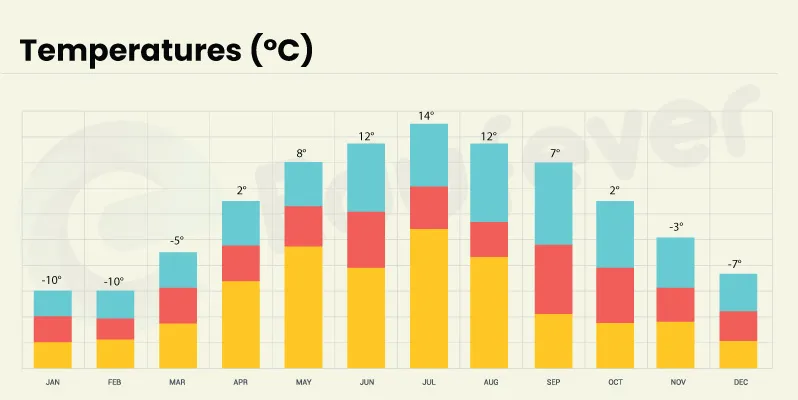
Contact Details
Pirogov Russian National Research Medical University Russia Address: 117997, Moscow, st. Ostrovityanova, building 1 Contact Number : +91 7827-804-741
Pirogov Russian National Research Medical University Gallery
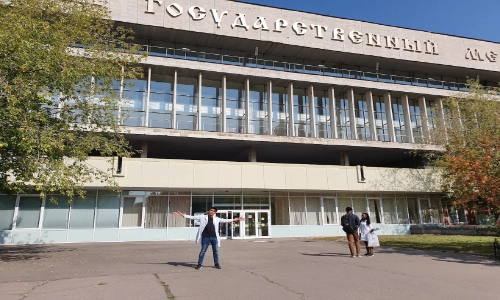
Frequently Asked Questions (FAQs)
Where is the pirogov russian national research medical university.
Pirogov Russian National Research Medical University Address is 117997, Moscow, st. Ostrovityanova, building 1.
What is the MBBS course duration at Pirogov Russian National Research Medical University?
The MBBS course duration at Pirogov Russian National Research Medical University is 6 Years.
Is the Pirogov Russian National Research Medical University NMC Approved?
Yes, it is approved by the NMC.
Can poor Indian students study abroad?
Of course, there is no rich and poor when it comes to education; it is all about knowledge. Several scholarships are open to students, and the government of India also provides a scholarship option for academically intelligent students.
Does the Pirogov Russian National Research Medical University accept transferees?
Pirogov Russian National Research Medical University accepts transferees on a case-to-case basis.
- Admission Updates,
- Top Collages
You may like to read
- Kazan State Medical University Russia 2024-25: Admission, Fees, Courses, Ranking etc.
- Bashkir State Medical University Russia 2024-25: Admission, Courses, Fees, Eligibility, Ranking etc.
- Kazan Federal University Russia 2025-26: Fees, Ranking, Admission, Courses etc.
- Kursk State Medical University Russia 2024-25: Admission, Eligibility, Courses, Fees, Ranking etc.
About Manish Verma
Hello, I'm Manish Verma, with a year of expertise in MBBS and Ayush courses. I have detailed knowledge of various colleges' fee structures, cutoffs, and intake procedures. If you're looking for insights or assistance in pursuing MBBS or BAMS courses, feel free to comment below—I'm here to help!
Leave a Comment Cancel reply
Notify me via e-mail if anyone answers my comment.
Abroad MBBS Update 2024 : Admission Dates, Top College, Fees, Location, Scholarship etc.
Get admission to Top Overseas Universities with Affordable Fees.

Virtual Tour
Experience University of Idaho with a virtual tour. Explore now
- Discover a Career
- Find a Major
- Experience U of I Life
More Resources
- Admitted Students
- International Students
Take Action
- Find Financial Aid
- View Deadlines
- Find Your Rep

Helping to ensure U of I is a safe and engaging place for students to learn and be successful. Read about Title IX.
Get Involved
- Clubs & Volunteer Opportunities
- Recreation and Wellbeing
- Student Government
- Student Sustainability Cooperative
- Academic Assistance
- Safety & Security
- Career Services
- Health & Wellness Services
- Register for Classes
- Dates & Deadlines
- Financial Aid
- Sustainable Solutions
- U of I Library

- Upcoming Events
Review the events calendar.
Stay Connected
- Vandal Family Newsletter
- Here We Have Idaho Magazine
- Living on Campus
- Campus Safety
- About Moscow

The largest Vandal Family reunion of the year. Check dates.
Benefits and Services
- Vandal Voyagers Program
- Vandal License Plate
- Submit Class Notes
- Make a Gift
- View Events
- Alumni Chapters
- University Magazine
- Alumni Newsletter

SlateConnect
U of I's web-based retention and advising tool provides an efficient way to guide and support students on their road to graduation. Login to SlateConnect.
Common Tools
- Administrative Procedures Manual (APM)
- Class Schedule
- OIT Tech Support
- Academic Dates & Deadlines
- U of I Retirees Association
- Faculty Senate
- Staff Council
College of Education, Health and Human Sciences

Outside the Lines
Finding Sports Careers Off the Field
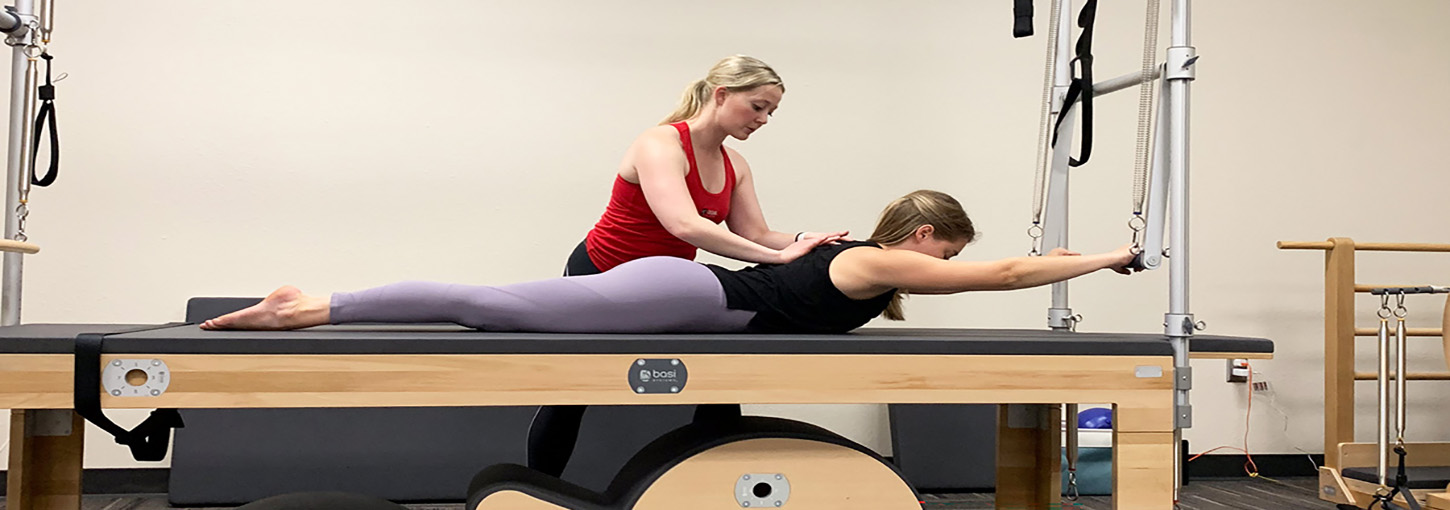
Become a Pilates Instructor
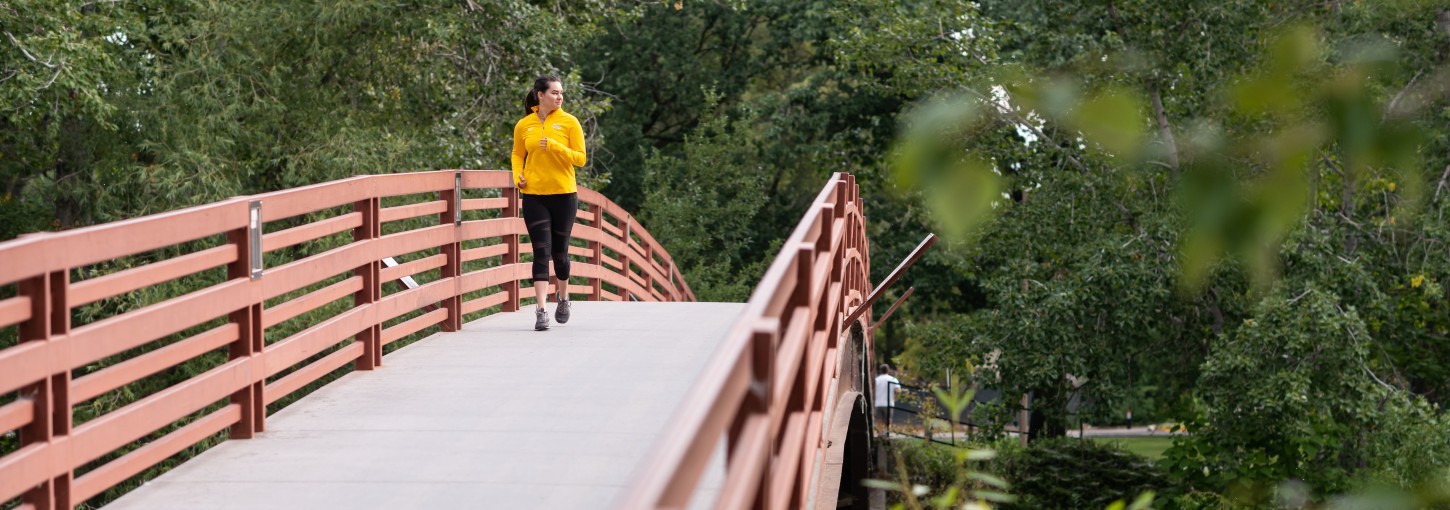
Finding Joy in Sports
Is it possible to learn to love running?

Run for Your Life
A Different Way to Keep Score
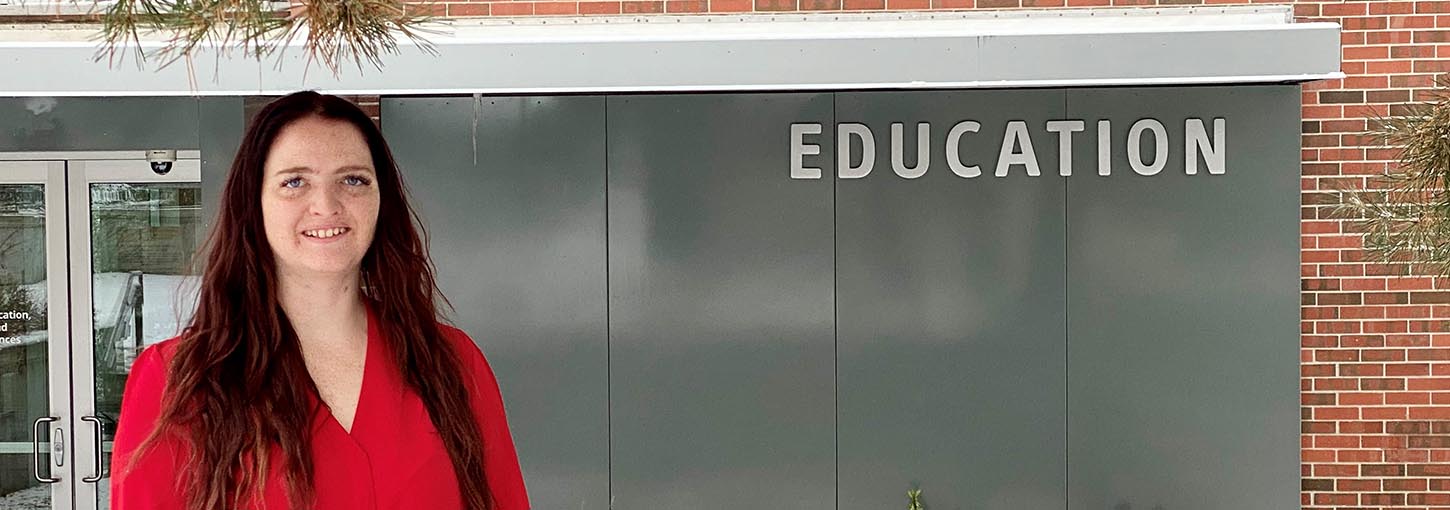
Making the Grade
New Graduate Masters Balancing Work and School

Home Court Advantage
Grad creates overseas basketball camps

Ready to Serve
Former Tennis Captain Teaches Life Lesson
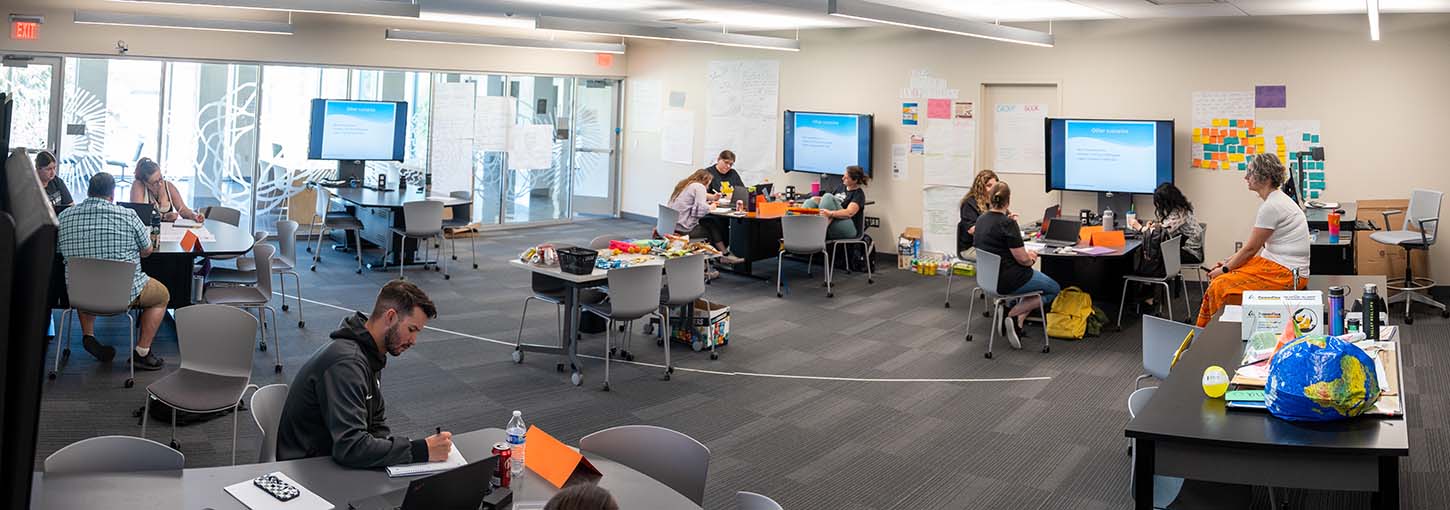
IMPACTing Idaho
Addressing special education teacher shortage
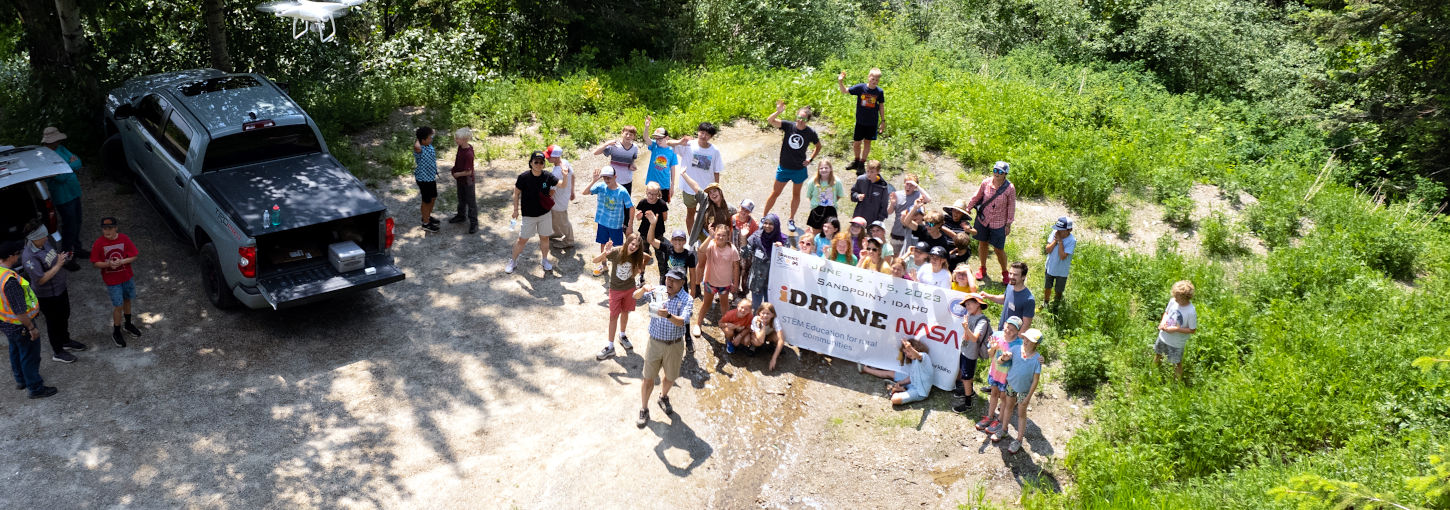
Learning to Fly
Middle School Students Discover Higher Learning
Physical Address: 921 Campus Drive Moscow ID, 83844
General Contact: Phone: 208-885-6772 Email: [email protected]
Student Services: Phone: 208-885-6610
Fax: 208-885-1071
Mailing Address: University of Idaho Boise Center 322 E. Front Street Boise, ID 83702
Phone: 208-334-2999
Fax: 208-364-4035
Email: [email protected]
Web: Boise Center
Coeur d'Alene
Mailing Address: University of Idaho CDA Center 1031 N. Academic Way, Suite 242 Coeur d'Alene, ID 83814
Phone: 208-292-2519
Fax: 208-667-5275
Email: [email protected]
Web: CDA Center
Future students, connect with EHHS!
Connect with us to explore our diverse range of degrees, discover hands-on learning opportunities, and gain valuable insights to kickstart your academic adventure.
- Student Research Symposium
- Doceo Center
- Doctoral Handbook pdf
- Pre-Health Professions
- Curriculum Center
- TRIO-INSPIRE
Dean's Welcome
EHHS cultivates innovative leaders, builds thriving communities, and shapes a healthy tomorrow.
Highlighted Program
Check out our new M.A.T. program, teach the subject you love.
College News
See what is happening in the College of Education, Health and Human Sciences and also at the University of Idaho.
Find out the News

College Departments
Curriculum and instruction.
This department prepares all students for rewarding careers in education from our undergraduate, graduate and doctorate degrees.
Leadership and Counseling
Graduate programs to prepare professionals for education leadership roles and business leaders.
Movement Sciences
Promoting healthy active living through undergraduate, graduate and doctorate degrees.
- General Information
- Areas of Research
- Departments and laboratories
- Management of the Center
- Microbiology Council
- Dissertations Committees
- Ethics Committee
- Russian Ministry of Health and WHO Centers
- Institute of Virology
- «Medgamal» Branch
- Electronic Library
- Vaccine against COVID-19
- Influenza vaccine
- Ftortiazinon
- Pertussis Vaccine
- Department of Infectious Diseases and Virology
- Postgraduate Studies
- News from the Academic Council
- News from Dissertation Committees
- News from the Microbiology Academic Committee
- News from departments and laboratories
- Educational news
- Professional scientific potential
- EBOLA vaccine
- Media about us
- News of the «Medgamal» Branch
The use of adenovirus vector technology for vector vaccines has been gaining momentum since the 1980s, and is safe and effective, which has been proven in multiple studies.
On 11 August, the Russian Federation Ministry of Health issued a certificate of registration with the number LP-006395 for a vaccine to help prevent the novel coronavirus infection COVID-19, developed by the Russian Ministry of Health N.F. Gamaleya National Research Center for Epidemiology and Microbiology.
In December 2015, the Russian Ministry of Health registered the first 2 domestically-produced vaccines against the Ebola hemorrhagic fever. Both these vaccines were engineered at the Russian Ministry of Health N.F. Gamaleya Federal Scientific Research Center of Epidemiology and Microbiology, and passed jointly held preclinical trials, and clinical trials, at institutions run by the Russian Ministry of Health and Ministry of Defense.
- Arnold School of Public Health
- Location Location
- Contact Contact
- Colleges and Schools
- 2024 News Archive
Rural and Minority Health Research Center marks 25 years with fifth funding cycle award
August 21, 2024 | Erin Bluvas, [email protected]
Scientists at the Rural and Minority Health Research Center will celebrate their 25-year anniversary this year, with eyes set on approaching their 30 th . The center has recently secured an additional $2.8 million in funding from the Health Services Resources & Services Administration’s Federal Office of Rural Health Policy – for the fifth consecutive cycle.
With steady guidance from the first three directors - Mike Samuels, Jan Probst (who led the center for the longest tenure of 15 years) and Jan Eberth, co-directors Elizabeth Crouch and Peiyin Hung are holding the reins with their eyes set on the 30th. Originally named the South Carolina Rural Research Center, the center has grown to include over thirty faculty/staff and affiliates and has continually expanded its services to respond to the existing and emerging concerns faced by rural and minority residents of the state. Since 2000, the center has completed over 80 research projects, produced 152 policy briefs, and published 277 original scientific publications and literature reviews examining issues of importance to rural health broadly and rural minority groups specifically.
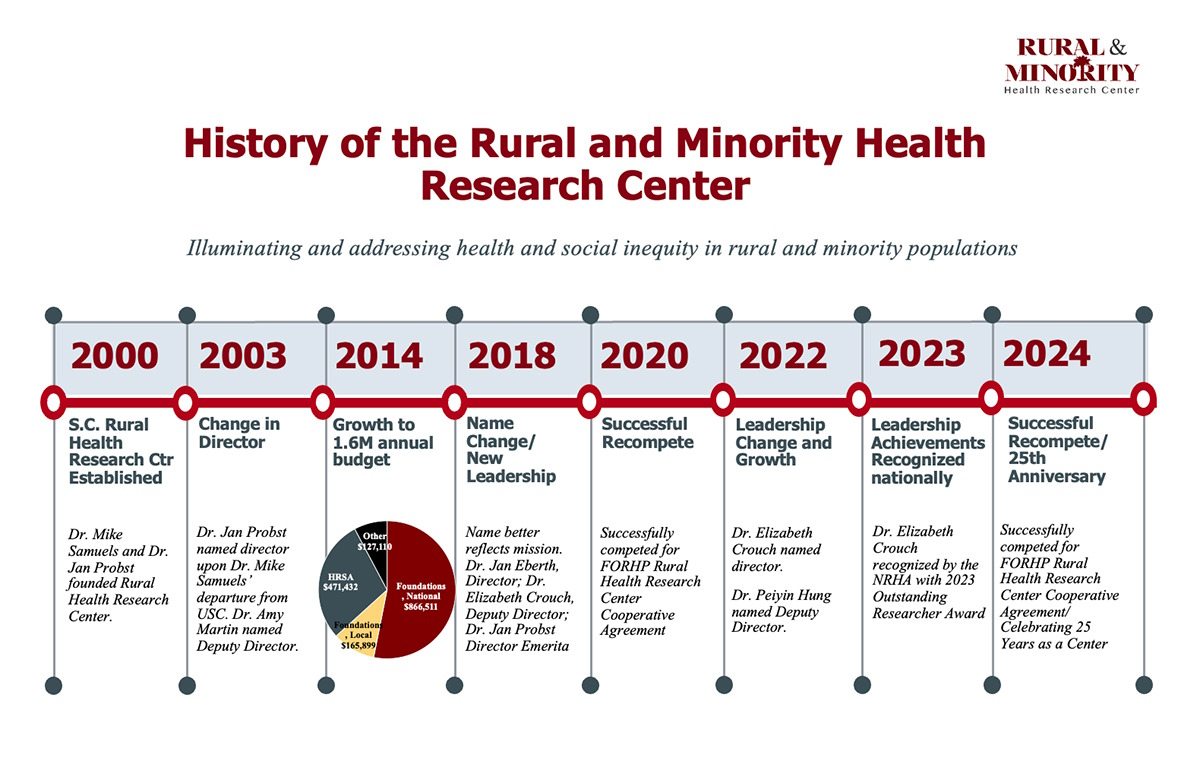
“Our mission remains on incorporating social determinants of health into rural health policy research, with the aim to enhancing access, quality and outcomes for rural Americans,” says Crouch, an associate professor in the Department of Health Services Policy and Management (HSPM). “During this new funding cycle, we will advance our established health policy work on the intersection of race and place by extending to Medicaid policy and services across urban and rural communities in the United States.”
Across these leaders and fundings cycles, the center has worked to develop methods and conduct research to better understand the health status, health care needs, and health services utilization of rural and minority populations. They also examine the effectiveness and amenability of rural health policies in improving health and removing barriers to care for these groups, especially those living in low-income households.
Our mission remains on incorporating social determinants of health into rural health policy research, with the aim to enhancing access, quality and outcomes for rural Americans.
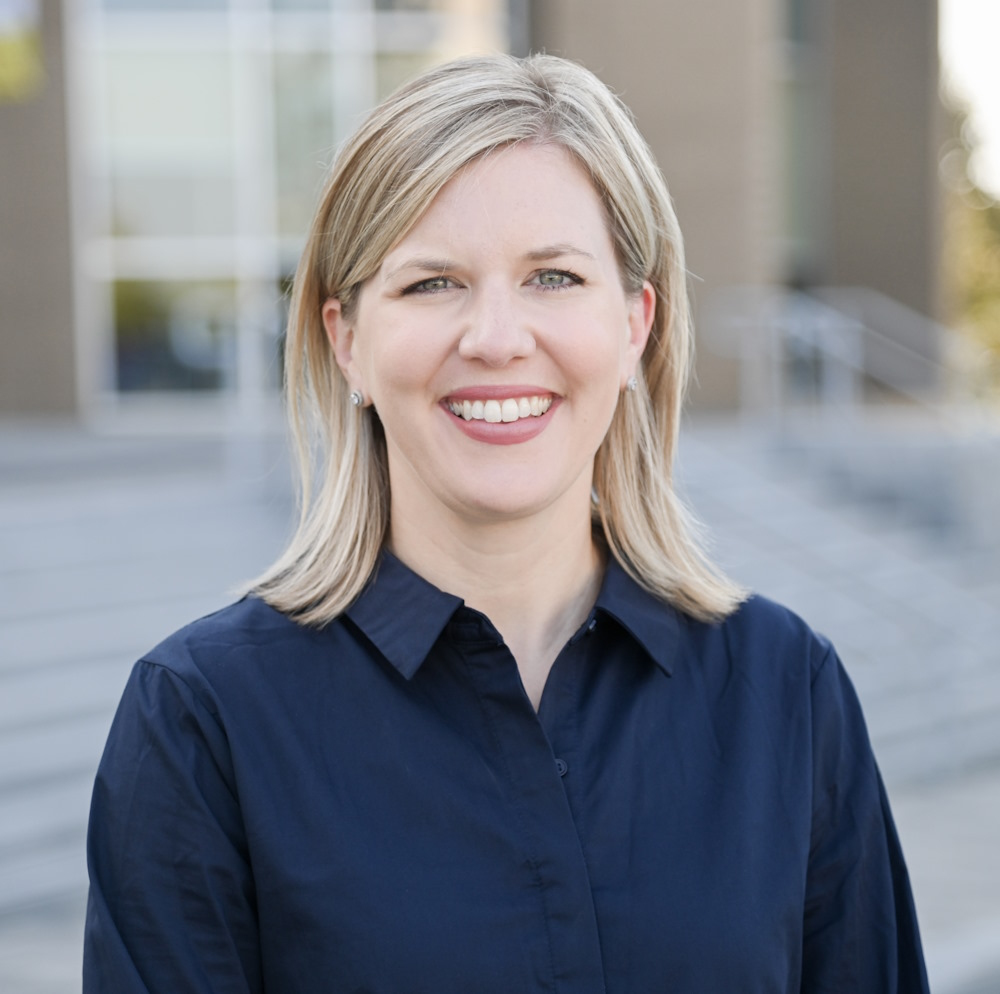
While this work spans various areas and methods, some of their projects include identifying geographic and racial disparities in mental health outcomes among postpartum women , combatting HIV and STIs in rural communities , investigating barriers to maternal health care access due to poverty and/or structural racism , and assessing whether telehealth adequately supports rural and minority pregnant women . Throughout these studies, they collaborate with researchers, public health practitioners and policymakers across the state.
“In this new phase, we are also expanding our external advisory committee,” says Hung, a HSPM associate professor. “This expansion aims to gather diverse inputs from rural health stakeholders, including national rural health policymakers, state rural health agencies, rural health care administrators, professional associations, community organizations, and rural patient advocates to guide our research priorities, methodology design, and dissemination of research findings. This continued support fuels our mission to advance rural health equity and research.”

Find Out More
The Rural and Minority Health Research Center works to illuminate and address the health and social inequities experienced by rural and minoritized populations to promote the health of all through policy-relevant research and advocacy.
You May Also Like
Researchers find geographic, racial disparities in postpartum readmissions involving mental health, substance use disorders
Research center combats spread of HIV, STIs in rural communities Elizabeth Crouch wins national award for contributions to rural health
Low-income communities face dual barriers to maternity care access Structural racism worsens maternal health disparities for some minority women during pandemic
Does telehealth fail minority, rural pregnant women during the pandemic?
Facility ownership matters in the provision of suicide prevention programs, study shows
Assistant professor Peiyin Hung, Rural and Minority Health Research Center contribute to Rural Action Plan
Peiyin Hung (HSPM) joins National Rural Health Association’s 2019 Rural Health Fellows Program
Challenge the conventional. Create the exceptional. No Limits.
Skip to main content
- Agriculture + Food
- Arts + Society
- Business + Economy
- Engineering + Technology
- Environment + Sustainability
- Health + Medicine
- Resources + Energy
- Search news
- UQ responds
UQ granted $6 million for two new Centres of Research Excellence
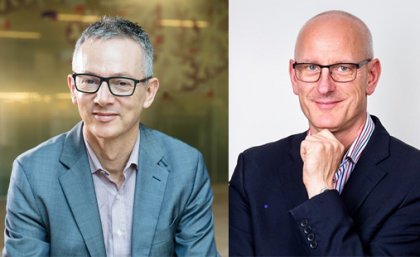
University of Queensland researchers have received two $3 million grants from the National Health and Medical Research Council (NHMRC) to accelerate knowledge and treatment of Alzheimer’s disease, and to improve gynaecological cancer treatment.
The funding will support collaborative research aimed at addressing pressing health challenges and improving patient outcomes.
Innovation in approaching Alzheimer's disease
A $3 million NHMRC grant will fund a new Centre of Research Excellence (CRE) in Mechanisms in Neurodegeneration – Alzheimer’s Disease (MIND-AD).
Led by Professor Jürgen Götz from UQ’s Queensland Brain Institute , the new centre is the first dedicated CRE to lead basic science research to investigate the underlying causes of neurodegenerative diseases.
“Using a multidisciplinary approach, we are aiming for discoveries that leapfrog us towards new disease-halting or reversing treatments, which have remained elusive for more than a century,” Professor Götz said.
“Alzheimer’s disease drug research has been largely focused on strategies to remove toxic amyloid-β and Tau aggregates from the brain, but the effectiveness of these drugs is yet to be determined.
“A growing body of evidence supports the multifactorial nature of Alzheimer’s disease, so the MIND-AD Centre of Research Excellence will take a more holistic approach.”
Professor Götz said the centre will look at the relationship between protein aggregation and misfolding and mitochondrial functions and exploit those links to engineer next-generation combination therapies.
“Our program will span molecular, cellular and brain-wide research, drug targeting and delivery as well as multiscale mathematical models,” he said.
“We will also nurture industry partnerships and support translation and commercialisation opportunities where appropriate.”
Improving gynaecological cancer treatments
A $3 million NHMRC grant will establish a new Centre of Research Excellence to Improve the Quality of Survival in Gynaecological Cancer Patients (ALIVE WELL).
Professor Andreas Obermair from UQ’s Centre for Clinical Research (UQCCR) will lead a team across 7 projects investigating the factors that impact the wellbeing of women treated for gynaecological cancers.
“The current treatment for most gynaecological cancers takes a brutal toll on patients,” Professor Obermair said.
“Some of the biggest concerns for these women include issues with fertility, lymphoedema or swelling caused by a lymphatic system blockage, and their general recovery from treatment.
“The new centre will focus on priority areas aiming to enable fertility after endometrial cancer, reducing lymphoedema and optimising cancer recovery.”
The centre builds on 6 clinical trials the team is currently running involving more than 2500 women with gynaecological cancer from around the world.
Three new clinical trials will commence under this CRE.
UQCCR researcher Dr Eva Baxter said each trial aims to address a different aspect of improving gynaecological cancer treatment and follow-up, and monitoring how this impacts women’s lives.
“We will look at things including pregnancy rates and cancer recurrence after treatment, healthy habits and exercise interventions for patients during and after treatment, and barriers to implementing new treatment pathways in clinical practice,” Dr Baxter said.
“Overall, our aim is to improve quality of life, health and function during and after gynaecological cancer treatment, so women can get back to living their best lives.”
Media contact
UQ Communications [email protected] +61 429 056 139
- Share on Twitter
- Share on Facebook
- Google Plus
Research , Awards and Achievements , Uni news
Arts + society , experts , research.

Engineering + Technology , Research

Experts , Research , Sport + Recreation

Experts , Health + Medicine , Research

Agriculture + Food , Environment + Sustainability , Experts , Global Change , Industry Collaboration , Research , Resources + Energy
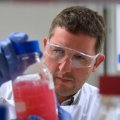
Experts , Health + Medicine , Research , Science

Environment + Sustainability , Research

Recent Headlines
- UQ recognised in Life Sciences Queensland Awards 30 August 2024
- Emerging UQ researchers secure ARC boost 28 August 2024
- UQ mid-career researchers top the nation in ARC Future Fellowships scheme 28 August 2024
The Conversation
What is eastern equine encephalitis two mosquito researchers explain what’s behind the latest outbreaks, the federal government’s proposed mis- and disinformation laws need to have clearer definitions – and include ai, why are tall people more likely to get cancer what we know, don’t know and suspect, the rba is making confusion about inflation and the cost of living even worse, considering taking wegovy to lose weight here are the risks and benefits – and how it differs from ozempic.
+61 7 3365 1111
Other Campuses: UQ Gatton , UQ Herston
Maps and Directions
© 2024 The University of Queensland
A Member of
Privacy & Terms of use | Feedback
Authorised by: Director, Office of Marketing and Communications
ABN : 63 942 912 684 CRICOS Provider No: 00025B
Quick Links
- Emergency Contact
Social Media
- Giving to UQ
- Faculties & Divisions
- UQ Contacts
Ph. 3365 3333
Pirogov Russian National Research Medical University
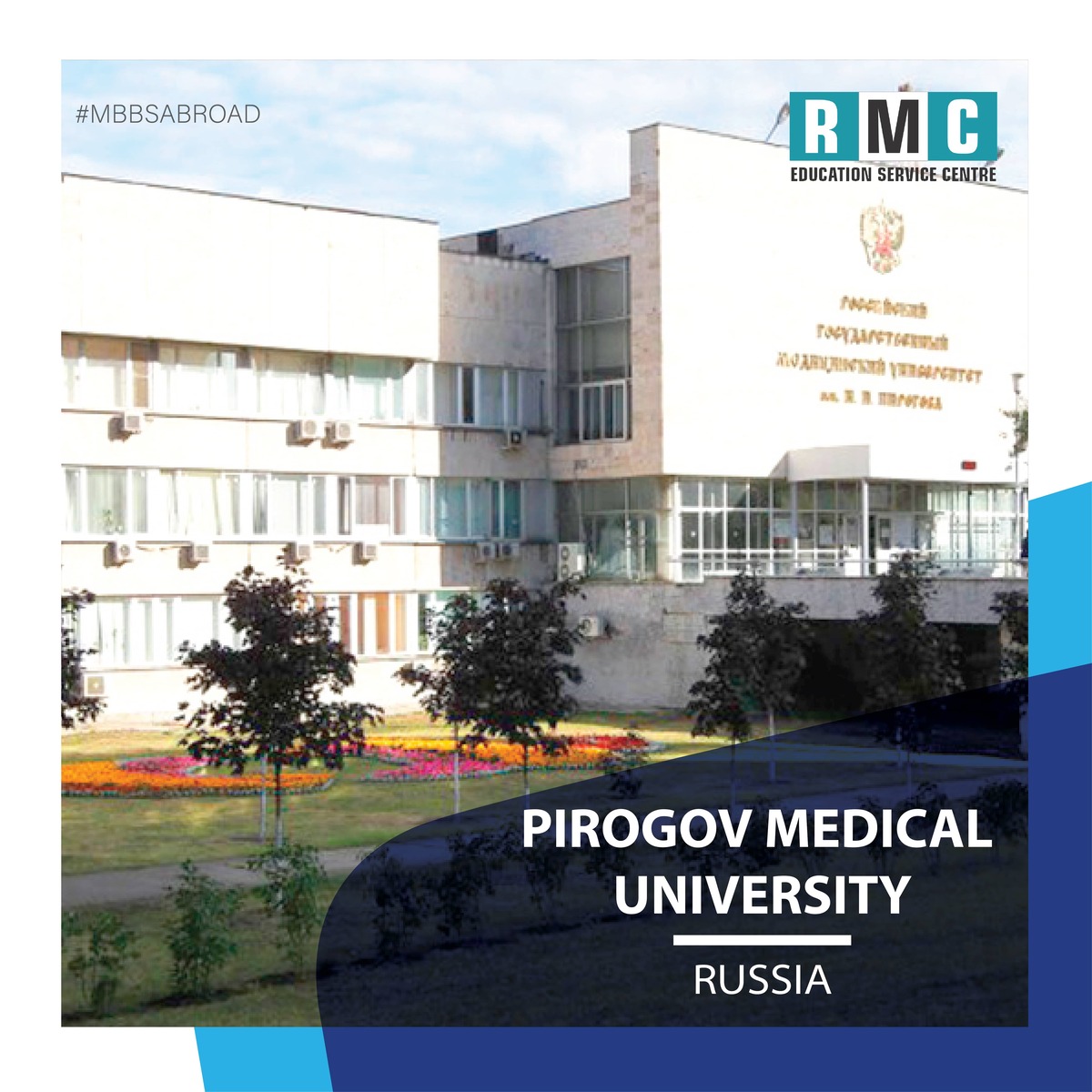
Ulitsa Ostrovityanova, 1, Moscow, Russia, 117997
Nearest airport: sheremetyevo international airport.

7,700 US$/ year
Starting fees:.
Moscow, Russia
City and province.
- It was founded in the year 1906
- Globally recognised University
- Approved by MCI and WHO
About Pirogov Russian National Research Medical University
One of the universities which is known to be the factory of doctor production is Pirogov Russian National Research Medical University. Pirogov Russian National Research Medical University (formerly referred to as Russian State Medical University or RSMU) may be a medical education institution in Moscow, Russia founded in 1906. It's fully accredited and recognized by Russia's Ministry of Education and Science and is currently under the authority of the Ministry of Health and Social Development.
Pirogov Russian National Research Medical University is one among the oldest medical high schools in Russia that's documented throughout the planet. In 2023-24, the University will celebrate its 115th anniversary. Pirogov Medical University is the pioneer organization in Russia that provided women with the chance to urge higher medical education. Pirogov Medical University is the pioneer within the world to determine a school of Pediatrics that serves as a model for creating such departments at other universities around the world. The varsity of Biomedicine, opened at Pirogov Medical University in 1963, was also one among the primary within the world.
More Information on Pirogov Russian National Research Medical University : MBBS Course
| Year of Establishment | 1906 |
| Type | Government |
| Recognition | NMC approved |
| Eligibility | 50% in Physics, Chemistry and Biology Aggregate |
| Course Duration | 6 Years |
| NEET | Yes, compulsory |
| IELTS/TOFEL | Not Required |
| Medium of Teaching | English / Russian |
Get Call Back from our MBBS Abroad Counsellors
Pirogov russian national research medical university ranking and accreditation.
| Pirogov Russian National Research Medical University Ranking ( world) | 677 |
| Pirogov Russian National Research Medical University Ranking ( country) | 24 |
Pirogov Russian National Research Medical University Ranking in the world as well as the country is very renowned. Active participation in medical training and accordingly the improvement of health care, constant assistance for research projects and thus the introduction of innovations enable us to take care of a number one posture in Pirogov Russian National Research Medical University Ranking.
- Pirogov Russian National Research Medical University Ranking is accredited by the Medical Council of India and approved by the World Health Organization.
- Pirogov Russian National Research Medical University Ranking is one among the highest rated medical universities in Russia .
- Pirogov Russian National Research Medical University Ranking is found within the liveliest and most spectacular cities in Russia.
- Most of the massive government hospitals in Moscow are affiliated to the Pirogov Medical University.
- The Pirogov Russian National Research Medical University specialises in post graduation subjects like Microbiology, Pediatrics and Therapeutic.
- The staff consists of over 1900 professors who teach 100 subjects within the same university fees itself which ensures top quality education.
- There is no specific requirement of marks or grades for admission to any course at Pirogov Medical University.
Pirogov Russian National Research Medical University location is one of the best suited places for education. In 1930, it became known as the 2nd Moscow State Medical Institute based on its Pirogov Medical University location and in 1956 it was named after the renowned Russian surgeon and anatomist Nikolay Pirogov, who was designated the founding father in the field of surgery and was one of Europe’s first surgeons to make use of ether as an anaesthetic. In 1847, he was the first surgeon to use anaesthesia in a field operation and also developed his own procedure of using plaster of paris castings to treat fractured bones. So it seems that one of Russia’s biggest medical universities was established after one of the country’s most widely known physicians. Pirogov Medical University location is best suited as it is situated in the middle of Ostrovityanova str. 1, Moscow, Russia. Pirogov Medical University location of campus is at the connection of hospital Moscow State Clinical Hospitals.
Infrastructure of Pirogov National Medical University
The first lecture was convened on September 26, 1906, the primary graduation was in spring 1912. The course was incredibly popular. Accordingly, in 1906 medical personnel audience numbered to 206 communities, in 1907–1908 years this number improved to 285 people. The doorway competition equaled 8.5 people per position. At the start of 1917, the medical faculty of the Courses studied around 1060 students.
During its survival, the University has equipped quite 70,000 doctors who satisfied and still complete their professional duty altogether in parts of Russia and abroad. The achievements of the RSMU are the involvement of several generations of professors, lecturers, researchers, students, administration and force. The Scheme of the University presently and in future is to be a capable beneficiary of the honour and recognition of the earlier generations and to proceed and enhance the University’s good traditions.
Pirogov National Medical University provides library facilities to the scholars. The library was established within the year 1906, it's located on the school campus. It consists of seven ,50,000 volumes of books. Also, the library is connected with an internet facility for the advantage of the scholars. Also, it provides e-journal & e-book access to the scholars. This library consists of 12,15,000 numbers of scientific literature and 1,71,000 numbers of the textbooks with 6,48,000 thousand fictional books.
Advantages and Facilities offered at Pirogov Russian National Research Medical University
The Pirogov Russian National Research Medical University offers a convenience office for the upside of the researchers. The lodging rooms are accessible on sharing, 2 or 3 people can share a territory. The lodging highlights a typical kitchen office, where understudies can set up their own food. The lodging rooms are ensured 24×7 with a profoundly observed CCTV office. On the off chance that the understudies need a convenience office they need to exhaust each month 1638 (Rubles). The lodging rooms are available simply on the impression of a Lease with an endorsement.
Pirogov Russian National Research Medical University gives a games office to the benefit of the researchers. The games complex is developed with all moderately contemporary abilities. Coming up next are games offered by Pirogov National Medical University like football, running, volleyball, ball badminton, hockey, strike ball, b-ball, tennis, paddling too. Understudy recreation times are improving the wellbeing of the understudy's during an extraordinary time.
A prepared rec center and jungle gym offices are accessible for the benefit of the researchers , it's all very hardware as well. Indoor and outdoor games, chess, darts, sambo, swimming offices are accessible during this Pirogov clinical college. These solid games activities are associated with the understudy's wellbeing. This is regularly the significant explanation behind subsidizing sports and games activities at Pirogov Medical college.
Indian nourishments are accessible inside the Pirogov Russian National Research Medical University for Indian understudies there's flasks and bistros accessible on the college grounds. Those containers are serving Indian nourishments moreover.
| Establishment | 1906 |
| Total seats in MBBS | 100 |
| Tuition fees | Rs 5,60,000 per year |
| Living expenses | Rs 6000-10,000 approx per month |
| Hostel | In campus hostel |
| Food | Indian canteen food available |
| Medium of instruction | English |
| Duration of course | 6 years |
| Institution type | Government |
| Admission season | September |
| Affiliated to | Pirogov Russian National Research Medical University |
| Recognition and listing | Medical council of India (MCI), World health organisation (WHO) |
| Affiliated hospital | Moscow State Clinical Hospitals are affiliated to with this University |
| Other names | RNRMU, Pirogov Russian National Research Medical University, Pirogov Medical University, Pirogov Pirogov Medical University |
| Address | Pirogov Medical University, Ostrovityanova str. 1, Moscow, Russia, 117997. |
| Website | http://pirogov-university.com |
Pirogov Russian National Research Medical University Fees Structure 2023-24
| Particulars | Year 1 | Year 2 | Year 3 | Year 4 | Year 5 | Year 6 |
|---|---|---|---|---|---|---|
| Tuition Fee (approx.) | $7700 | $7700 | $7700 | $7700 | $7700 | $7700 |
| Fees in Indian Rupees | Rs.6.16 Lakhs | Rs.6.16 Lakhs | Rs.6.16 Lakhs | Rs.6.16 Lakhs | Rs.6.16 Lakhs | Rs.6.16 Lakhs |
| Hostel Fees | $300 | $300 | $300 | $300 | $300 | $300 |
| Hostel Fee in Rupees | Rs.24,000 (approx.) | Rs.24,000 (approx.) | Rs.24,000 (approx.) | Rs.24,000 (approx.) | Rs.24,000 (approx.) | Rs.24,000 (approx.) |
| Total Fees in Indian Rupees | Rs.6.40 Lakhs | Rs.6.40 Lakhs | Rs.6.40 Lakhs | Rs.6.40 Lakhs | Rs.6.40 Lakhs | Rs.6.40 Lakhs |
| Study MBBS In Pirogov Russian National Research Medical University | ||||||
- $1 = Rs.80(It may vary)
- Mentioned fee are approximate and it may change as per the change in currency
Eligibility criteria for Pirogov Russian National Research Medical University Admission 2023-24
Pirogov Russian National Research Medical University Eligibility helps invite applications from understudies of all nations who are intriguing in concentrating on medication, biomedicine, drug store, psychology or sociologies. Pirogov Russian National Research Medical University Eligibility offers Bachelor's and Specialty Degree programs for candidates who have finished advanced auxiliary school. Master's, Residency and Postgraduate projects are accommodated for the individuals who wish to proceed with their examinations in higher school (the degree of instruction needed for confirmation is shown in the portrayal of the important program).
Most instruction at the University is done in Russian (except for some English-explicit projects). On the off chance that you pick the program in Russian, you should be persuaded that you have adequate familiarity with composing and communicating in Russian to adapt to the program from the beginning. Our one-year preliminary courses can help you in studying Russian just as science and science, before you start training in higher school.
Peruse the "Confirmation Regulations" to decide the monetary premise of your preparation and to get to know the rundown of archives needed just as tests and cutoff times for accommodation of reports.
- Unfamiliar residents and people without citizenship who are comrades living abroad
- Unfamiliar residents qualified for advanced education to the detriment of budgetary assignments as per global arrangements and intergovernmental arrangements of the Russian Federation.
- Other global understudies can likewise learn to the detriment of the bureaucratic financial plan, in the event that they have won a grant inside the amount set up by the Government of the Russian Federation.
- spots under agreements for the arrangement of paid instructive administrations
- Spots as indicated by the headings of the Ministry of Science and Higher Education of the Russian Federation
On the off chance that you don't have the consequences of the Unified State Examination of Russia or a state grant, you should go to the college to finish the placement tests. In the event that you need a visa to enter Russia, demand a greeting from us ahead of time.
In the event that you need legitimization of instructive reports in Russia experience strategy of unfamiliar schooling acknowledgment. We can help you in perceiving optional instruction reports for documenting at our college. Acknowledgment of records for accommodation to a few colleges in Russia and reports on advanced education is completed by an approved association.
Kindly, note: Getting a greeting and a visa takes over a month. Remember this when arranging your visit.
Submit Application for Admission and Pass Exams According to Pirogov Russian National Research Medical University Eligibility.
You can submit records to the confirmation office face to face, by means of electronic accommodation structure or through postal assistance, for example, DHL.
Prior to tests, future understudies can test their insight with the assistance of practice testing (the quantity of endeavors isn't restricted).
Effectively Pass Exams and Get Documents of Enrollment
- Your assertion of agree to enlistment;
- The first report on the current training or a duplicate thereof, confirmed in as indicated by the set up method,
- Furthermore, an archive on installment of preparing (receipt) for understudies whose will read on agreements for the arrangement of paid instructive administrations.
Pirogov Russian National Research Medical University Admission Procedure
- Step 1 : Submit scanned copy of class 10th mark-sheet & passing certificate(if available) , 12th mark-sheet, NEET result & passport,
- Step 2 : Submit duly filled Application Form & along with Undertaking Form provided by Pirogov Medical University fees along with above mentioned set of documents.
- Step 3 : Make payment in favour of Pirogov Medical University for the initial booking amount through online transfer or by visiting Pirogov Medical University fees office.
- Step 4 : Pirogov Russian National Research Medical University Admission Letter will be issued along with Pirogov Russian National Research Medical University Admission fees structure within the next few weeks confirming your Pirogov Medical University Admission.
- Step 5 : Submit original marksheet/ passing certificate of 10th, 12th, passport, 10 passport size photos.
- Step 6 : Invitation letter will be issued from Immigration section of Russia and will be submitted to the Embassy of Russia in India.
- Step 7 : Visa application documents will be prepared by Pirogov Medical University Admission block and submitted along with the invitation letter to issue a study visa.
- Step 8 : Submit HIV Report and other medical reports as insisted by University as per the guidelines provided by Pirogov Medical University Admission Brochure.
- Step 9 : All original documents with passports submitted will be returned to students in the Pirogov Medical University fees along with visa and apostle.
- Step 10 : Gather at the airport for departure, where a representative from Pirogov Medical University Admission block will be available till your departure.
- Step 11 : Meet academy representatives at the airport on arrival and follow next steps as instructed for final enrollment.

Documents Needed For Pirogov Russian National Research Medical University Admission
- Transfer Certificate
- 6 Passport size photographs
- Scanned copy of passing certificate of class 10th
- 8 color photograph with white background 3”4”
- Passport or ID Card.(minimum valid for two years)
- Migration Certificate
- Original 12th mark sheet and certificate
- 10th and 12th Marksheets
- Medical Council of India’s Eligibility certificate
- HIV test reports and health security by a recognized hospital
- Birth Certificate
- Scanned copy of passing certificate and mark sheet of class 10th and 12th
- Scanned copy of NEET Result
- NEET Score Card
Frequently Asked Questions
For “General Category” students, they should have scored minimum 50% marks in PCB i.e. Physics, Biology & Chemistry in senior higher secondary examination (12th). For “SC / ST / OBC Category”, students should score minimum 40% marks in PCB.
Yes, It is compulsory to qualify NEET to get the required Eligibility Certificate to appear in screening test after completion of MBBS course and to get registered.
The minimum age Criteria is that the student has to complete 17 years on 31 December 2020
English is the basic medium of instructions.
The duration of course is 6 years.
The guidelines are present online on the official website.
Top Medical Colleges
- V.N.Karazin Kharkiv National University
- Ivano-frankovsk State Medical Univesity
- Lugansk State Medical University
- Kiev National Medical University
- Cremia State Medical University
- People Friendship University
- Saint Petersburg State Medical University
- Kazan State Medical University
- Tver State Medical University
Philippines
- The University of Perpetual Help System
- Our Lady of Fatima University
- Cagayan State medical University
- Cebu Doctor University
- Southwestern University
- Manila Central University
- Huazhong University of Science and Technology
- Guangzhou Medical University
- Fujian Medical University
- Chongqing Medical University
- China Three Gorges University
- China Medical University
- Central South University
- Capital Medical University
- Beihua University
- Tianjin Medical University
- Weifang Medical University
- Hebei United University
- Hebei Medical Uinversity
- Jiamusi Medical University
- OSH state Medical University
- International University of Kyrgyzstan
- Gomel State Medical University
- Grodno State Medical University
Central America
- Central America Health Science University
South America
- Texila American University
- American International Medical University
- Study MBBS in Abroad AMA school of medicine
- Study MBBS and MBBS Admission Abroad in Mauritius
- How to Study MBBS in China for Indian Students
- Abroad MBBS Admission Consultants for Low Fees MBBS admission in china
- Low Fees Study English Medium MBBS Program in China
- Low Fees MBBS Admission in Bangladesh MCI Approved Medical
- Mbbs/ Medical Study in China with Low Fee Package or in affordable cost

Testimonials
Tianjin University is a fine university with standard syllabus, homely environment and friendly and talented teachers. The teaching process is based on practical knowledge. Assignments, projects and seminars are frequently assigned to enhance student’s knowledge. I thanks to RMC for all your help.
POOJA SINGHAL (AGRA, UP), STUDENT CHINA
- 9810770128, 9810555386 9810555494, 9810555621
Contact USA Pulses
- About the USA Dry Pea & Lentil Council /
USA Dry Pea & Lentil Council

2780 West Pullman Road
(208) 882-3023
Other information
The national dry pea, lentil and chickpea industry office is located directly on the state line between Idaho and Washington. The office is open weekdays from 8 a.m.–4:30 p.m.
Needing specific information? There are ten friendly people on staff who can answer your questions.
Matthew’s story: The gift of research and an easier road
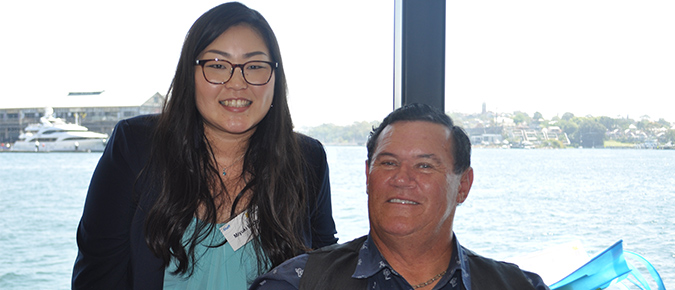
Matthew started life as a happy ‘outback boy’, living 320km inland from Port Hedland in Western Australia surrounded by red dirt. He was home schooled by radio school until the age of 12, as the drive from his front gate to his home took three and a half hours.
“If you put a city kid in my homestead they wouldn’t survive,” he recalls fondly.
At 13 years old, he went to a boarding school in Perth, which was almost a six-hour flight from home. Matthew recalls how different it was to see grass and a main street for the very first time.
He adapted to city life, surrounded by kids for the first time, and became a keen sportsperson and healthy, active young man. After school, he stayed in Perth to further his education and began studying Microbiology at university.
Facing a cancer diagnosis
In the middle of a university semester, Matthew collapsed on a sports field and his life completely changed. He hadn’t been feeling too well, but the last thing he expected was a stomach cancer diagnosis.
Matthew said it took him a while to accept his diagnosis, and he struggled for a long time with the question of ‘Why me?’.
He faced this nightmare at just 23 years of age.
Matthew endured nine months of chemotherapy . He recalls going “to the wars and back” and that the cancer diagnosis and treatment were the “hardest time for me”.
It was the 1980s, a time when treatments were comparatively unsophisticated.
Getting through the challenges of treatment
He had difficulty adjusting to the treatments, he was “up and down like a yo-yo” for the first six months and lost a huge amount of weight. Luckily, his university was supportive and allowed him to take time off, but otherwise Matthew found there was a lack of support available and felt isolated.
“Chemotherapy was rough. In the early days of having cancer no-one really explained the side effects. Doctors couldn’t explain why you lose your hair or why you lose your teeth,” Matthew remembers.
He began experiencing depression as a result of the cancer and treatment. Unfortunately, awareness surrounding mental health was particularly poor, and he did not receive appropriate support.
Luckily Matthew has now been cancer free for over 30 years. He finished his studies and began working as a Forensic Specialist for the Australian Federal Police. In this role he worked across the country, as well as in Istanbul, Kuwait and London.
In 1991 he was posted in Albury for a case. Upon spending time with the ‘fantastic community’ Matthew was inspired to retire to Albury in 2004.
Despite having no family in Albury, Matthew has been embraced by the community and has hundreds of ‘mothers and fathers’, who ‘keep an eye’ on him. He believes he ‘couldn’t ask for anything better’ then living in Albury.
Helping others with his experience
In retirement Matthew is busier than ever between helping homeless people, being the Verger of St Matthew’s, and driving patients to Albury’s cancer centre. He says he has been shaped this way by his own difficult cancer experience, and those of his 37 friends who have also been directly affected.
In 2007, he worked with his community to raise cancer awareness among young people by organising a Relay For Life team. That first year, there were 35 St Matthew’s Angels; since they have participated every year and grown to 150-strong.
“The young ones are our future. They have to continue our work,” Matthew believes.
Matthew is passionate about supporting those affected by cancer and is a strong advocate for research. “Research is very important. I had to go through cancer the old school way. Research makes it easier for people,” he says.
Leaving a legacy that continues to help others
Driven by his belief in the importance of research, Matthew has chosen to leave a generous gift in his will of 80% of his estate to Cancer Council NSW.
He sees supporting Cancer Council as supporting the community, saying it’s “a good cause and something I care for.”
As he says, “if you haven’t had cancer, someone in your life has or will.”
Matthew celebrates the advances in treatment and support services made since his own cancer experience but knows more improvement is needed.
“We need research to prevent, and to help and make it easier for those who get cancer… to let people live longer. Hopefully people in the future won’t have to go through the hell we did”, says Matthew.
Leaving a gift in will means a world of difference to researchers working towards a cancer free future.
If you would like to leave a gift in your will or find out more, please visit cancercouncil.com.au/ways-to-donate/bequests or talk to our team on 02 9334 1479 .
Liver cancer: an unprecedented health crisis, but we can reverse the trend
Congratulations to professor karen canfell, companion of the order of australia, finding new ways to overcome advanced bowel cancer drug resistance.
Welcome to the United Nations

How to tackle gender disparity in African climate change research
Get monthly e-newsletter.

African women researchers are transforming the continent while functioning as community organizers and entrepreneurs. Yet African women experience significant barriers in the continent’s research and academic landscape.

In Nairobi, Dr. Nzambi Matee created a fix for plastic waste using eco-friendly paving blocks. In Kenya, Veronica Okello researches sustainable processes for removing heavy metals from the environment. In Nigeria, Dr. Francisca Okeke studies the effects of solar activity in the ionosphere on earth's magnetic field to support climate solutions and Dr. Amina Ahmed El-Imam heads research teams working on renewable fuel.
These are some recent scientific contributions from African women. Before them, the late biologist Dr. Wangari Maathai, who bagged a Nobel Prize for climate activism, paved the way.
A paper by the United States National Institutes of Health states that in Guinea, a mere 6 percent of researchers are women. African institutions have poor systems for examining and ensuring the representation of women and lack strategies for supporting women’s work-life balance. In addition, existing employment processes advantage men. Compared to women in other regions, cultural and gender norms and unequal education further limit African women who manage a greater percentage of domestic duties.
Without African women, research excludes issues relevant to women worldwide and causes bias in research conclusions. Female researchers can provide unique perspectives and novel problem-solving methods, resulting in more complete and inventive answers. Climate change, which disproportionately affects Africa, further accentuates the disparity experienced by African women scientists, who are more active than men in the agricultural, health, and environmental sectors—areas that are heavily impacted by climate change.
In her foreword to “Women Researching in Africa: The Impact of Gender,” Dr. Tirsit Woldeyohanes writes of her childhood in Ethiopia: “Females who strive to be independent and go outdoors are derided and called critical and discouraging names. These hurdles from society have the power to compromise girls’ ability to learn and achieve higher education.”
Male researchers in Africa have greater representation, produce more research, publish more papers, and achieve positions of greater seniority, securing senior roles faster than women researchers.
Men are also better paid. A 2020 World Economic Forum report found that sub-Saharan African women earned 68 percent of what their male counterparts earned. UN Women reported women earn 21 percent less than men in East and South Africa. There is reportedly a pay gap for women of up to 77 percent in Nigeria.
Without up-to-date scientific publications and proficiency in current techniques and technologies, African women researchers will lag behind their peers in wealthier nations.
Lack of financing
The UN maintains that resolving gender gaps is essential to achieving thriving, sustainable societies. To achieve progress in gender equality, we must understand why an inadequate number of female researchers in Africa exists.
The journal Nature points to the lack of financing as particularly relevant in explaining why African women scientists face more challenges in pursuing careers in science, technology, engineering, and mathematics (STEM) than women in high-income nations. At the heart of this disparity is inadequate government funding, which Fadhel Kaboub, president of the Global Institute for Sustainable Prosperity, traces to colonialism’s continuing suppression of African economies.
African countries are impoverished by external debt. They are a primary source of low-priced, raw materials for wealthier nations yet must consume the expensive industrialized results from those nations.
These nations are destinations for discarded technologies and products, exacerbating issues of environmental degradation. Against this backdrop, African women must overcome tremendous limitations to sustain research careers, but there is hope.
One example of hope can be found in Nigeria, Africa’s most populous nation. In 2012, Nigeria implemented a Science, Technology, and Innovation (STI) policy with the mainstreaming, increase, and incentivization of women in STI as an objective. Expanding mentorship opportunities was a strategy in the policy.
“In some parts of the Eastern region [of Nigeria], they don’t believe that a woman can take decisions, talk less of being able to help the nation. Thankfully, my father was a teacher, and his orientation helped a lot… I am grateful for the opportunity to mentor a lot of female scientists,” notes Dr. Okeke, in a newspaper article .
Nigeria must fully execute its plan to increase the number of women scientists. More African countries must follow, harnessing networking and career-building opportunities, combating sociocultural barriers, and providing funding support.
The role of the youth
The future of Africa – its youth – hangs in the balance. The 2024 Summit of the Future is a timely event. The UN states that “Young people are the driving force behind innovation, progress, and positive change in our world. Their energy, creativity, and fresh perspectives are essential for shaping a sustainable and inclusive future for all.”
Early Career Researcher (ECR) programmes that target and mentor youth are necessary for Africa’s nearly 600 million women and girls.
In the research ecosystem, academic publishers can also help nurture African women researchers’ careers by building ECR programmes for women and girls that leverage Open Access (OA) policies to expand the availability of scholarly materials and by providing training. OA publications can be read gratis, are referenced more frequently, and facilitate cross-border collaboration among scholars.
Without up-to-date scientific publications and proficiency in current techniques and technologies, African women researchers will lag behind their peers in wealthier nations.
Publishers can help link academic institutions to funders to help researchers cover financial gaps. Further, publishers can nurture networking among institutions on the continent, encouraging collaborations between institutions to ensure research cohesion. This will deepen clarity about continent-wide issues like climate change.
In sum, tackling gender disparity in African research requires holistic strategies that include addressing national debt and cultural biases, provision for OA, and targeted measures to support girls and women ECRs.
Eseohe Arhebamen-Yamasaki is the Head of Communications, U.S., for Springer Nature. She leads her organization’s global Early Career Researcher programme and is a member of its Global Black Researcher Taskforce.
Also in this issue

The Woman Leading Angola’s Fight for Wetland Conservation

Telling Africa’s story through drone photography

WHO Director-General declares mpox outbreak a public health emergency of international concern

Maada Bio makes Africa’s strong case for reforms of the UN Security Council

Partnership brings the fire for human rights and the Sustainable Development Goals

Nigeria’s roadmap to digital transformation under the AfCTA
More from africa renewal.
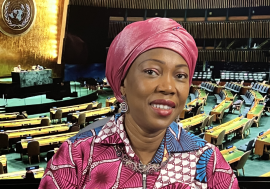
Empowering change: Safeguarding women in Sierra Leone

‘Transforming4Trade’ will reshape African economies

Fighting gender-based violence and early marriages

Nigeria prioritizes climate action to mitigate natural disasters

IMAGES
COMMENTS
Pirogov Russian National Research Medical University (formerly known as Russian State Medical University or RSMU) is a medical higher education institution in Moscow, Russia founded in 1906. It is fully accredited and recognized by Russia's Ministry of Education and Science and is under the authority of the Ministry of Health and Social ...
Research Institute for Healthcare and Medical Management of Moscow Healthcare Department ( NIIOZMM DZM) is a leading scientific organization of the healthcare system in Moscow that conducts research into healthcare development, continuous improvement and efficiency of management models in healthcare.
In early August, the National Health and Medical Research Council (NHMRC) released a statement encouraging sex, gender, variations of sex characteristics and sexual orientation to be routinely ...
Medical and Sociological Research Center for medical and sociological research collects, processes, monitors, consolidates and analyzes public opinion, medical staff and experts' views in order to improve Moscow healthcare system.
Pirogov Medical University is also approved by the Medical Council of Canada (MCC) and the Medical Council of India (MCI). The University offers a 6-Year Program for MBBS in Russia for local as well as international medical aspirants.
The Institute for Health in the Human Ecosystem is a multidisciplinary and collaborative center for excellence to build a more sustainable human ecosystem through research, teaching and outreach.
The Federal Medical-Biological Agency[ 3] ( FMBA; Russian: Федеральное медико-биологическое агентство, ФМБА России) is the national public health institute of the Russian Federation. The agency is a federal agency under the Government of Russia and is headquartered in Volokolamsk Highway, in Moscow.
Dr. Amy P. Patterson, director of scientific research, program policy, and strategic initiatives at the National Heart, Lung, and Blood Institute, will discuss a project funded by the NIH Common Fund, Communities Advancing Research Equity for Health™ (CARE for Health™). This is a newly formed national network for conducting research in ...
Russia Among Global Top Ten Improvers for Progress Made in Health and Education, says World Bank Report MOSCOW, September, 16, 2020 - Russia is among the top ten countries globally for improvements to human capital development over the last decade, according to the latest update of the World Bank's Human Capital Index (HCI).
Thanks to the merger of three leading Russian research institutes in the field of oncology, radiology and urology, National Medical Research Radiological Centre of the Ministry of Health of the Russian Federation has become one of the world leaders in nuclear medicine. An interdisciplinary council of doctors and the selection of optimal ...
Professor Janet Anderson from the School of Translational Medicine has received a National Health and Medical Research Council 2023 Partnership Projects PRC2 grant to lead a research project that will develop comprehensive geriatric assessments to improve perioperative care for older people.
National Medical Research Radiological Center of the Ministry of Health of the Russian Federation the main Federal Center for Expert Oncology - cancer treatment, hospitality, chemotherapy, palliative care, surgery.
Specialty: Psychiatrist Education 2015 - graduated from the I.M. Sechenov First Moscow State Medical University, specialty «General Medicine». 2015 - 2017 - clinical residency at the V.P. Serbsky National Medical Research Center for Psychiatry and Narcology. 2017 - until now - scientific work, passing postgraduate studies at the Department of...
Explore the official calendar of events for Russia's BRICS Chairship in 2024, featuring key international conferences and summits.
All the Updated Info about the Pirogov Russian National Research Medical University 2024-25 such as Courses, Admission, Documents, Fees, Ranking etc.
The College of Education, Health and Human Sciences is committed to innovation and research by providing undergraduate and graduate programs to meet the needs of aspiring students.
Occupational Health. The integrated area of preventive and clinical medicine, the main purpose of which is to preserve the worker`s health by studying the impact on it of the conditions of labor with a view to developing an integrated system for the prevention of occupational and work-related diseases.
The National Research Center for Epidemiology and Microbiology named after Honorary Academician N.F. Gamaleya of the Ministry of Health of the Russian Federation, founded in 1891, is one of the world's leading research institutes in its area.
Council Committees are the work groups that review agenda topics to either request additional information or research from City staff or commissions, or forward on those items for discussion and consideration by the full Council. Due to meeting schedules, most issues take at least 6 weeks to reach a full City Council meeting.
August 21, 2024 | Erin Bluvas, [email protected]. Scientists at the Rural and Minority Health Research Center will celebrate their 25-year anniversary this year, with eyes set on approaching their 30 th.The center has recently secured an additional $2.8 million in funding from the Health Services Resources & Services Administration's Federal Office of Rural Health Policy - for the fifth ...
Healthcare in Russia is provided by the state through the Federal Compulsory Medical Insurance Fund, and regulated through the Ministry of Health. [ 1] The Constitution of the Russian Federation has provided all citizens the right to free healthcare since 1993. In 2008, 621,000 doctors and 1.3 million nurses were employed in Russian healthcare.
About. The Master of Public Health (MPH) at Sechenov University is a multidisciplinary higher professional education programme which enables graduates (masters) to conduct research and management activities in the field of public health, to successfully work in the field, possess universal and subject-specific competences allowing them for ...
The Union of Mental Health of Russia and the Journal "Mental Health" announce the I All-Russian contest of research papers on mental health for students of medical and non-medical universities pursuing psychology, psychiatry, psychotherapy, sociology, law, economics studies.
US News is a recognized leader in college, grad school, hospital, mutual fund, and car rankings. Track elected officials, research health conditions, and find news you can use in politics ...
The funding will support collaborative research aimed at addressing pressing health challenges and improving patient outcomes. Innovation in approaching Alzheimer's disease. A $3 million NHMRC grant will fund a new Centre of Research Excellence (CRE) in Mechanisms in Neurodegeneration - Alzheimer's Disease (MIND-AD).
Pirogov Russian National Research Medical University Ranking is accredited by the Medical Council of India and approved by the World Health Organization.
The USA Dry Pea & Lentil Council and the American Pulse Association represent the dry pea, lentil, dry bean, and chickpea industry in the United States. Also known as "pulses" these crops are nutritional powerhouses packed with protein, fiber, and other essential nutrients.
What's New: Maricopa Community Colleges has been recognized as the only community college district in Arizona included on Forbes 2024 list of America's Best In-State Employers. The system, supported by more than 10,000 faculty and staff members, has been a staple among higher education institutions in the Valley, serving learners for over 100 years.
"Research is very important. I had to go through cancer the old school way. Research makes it easier for people," he says. Leaving a legacy that continues to help others . Driven by his belief in the importance of research, Matthew has chosen to leave a generous gift in his will of 80% of his estate to Cancer Council NSW.
A paper by the United States National Institutes of Health states that in Guinea, a mere 6 percent of researchers are women. African institutions have poor systems for examining and ensuring the ...